UNIVERSITY OF WASHINGTON PRESS
FALL 2023

The University of Washington Press is the oldest and largest publisher of scholarly and general interest books in the Pacific Northwest.
We publish compelling and transformative work with regional, national, and global impact. We are committed to the idea of scholarship as a public good and work collaboratively with our authors to produce books that meet the highest editorial and design standards. We value and promote equity, justice, and inclusion in all our work.
Publisher for the u niversity of Washington
Publishing
We publish books in the following core academic areas:
American Studies
Anthropology
Art History / Visual Culture
Asian American Studies
Asian Studies
Critical Ethnic Studies
Environmental History
Native American and Indigenous Studies
US History
Women’s, Gender, and Sexuality Studies
We also publish vibrant nonfiction about the Pacific Northwest and beyond, often in partnership with museums, cultural organizations, and Indigenous nations and communities.
s u PP ort the P ress!
We rely on generous gifts and grants from individuals and foundations to publish the books you see in this catalog and on our website. Partner with us by making a tax-deductible gift. For information about ways to give, please contact Nicole Mitchell at nfmm@uw.edu or make a gift online at www.uw.edu/giving/uwpress.
Conne C t W ith us online
https://uwapress.uw.edu/newsletter
@UniversityofWashingtonPress
@UWAPress
UNIVERSITY LIBRARIES
Front Cover: PaykanArtCar, 2021, by Alireza Shojaian.
UWashingtonPress
https://uwpressblog.com
@uwapress
The press serves the research, education, and outreach missions of the University of Washington by publishing vital new work for an international community of scholars, students, and intellectually curious readers. P rogram
The University of Washington Press is a founding member of the Association of University Presses.
Ba C k C over : Eleven members of the Owls Club women’s softball team, Seattle, ca. 1938.
Photograph by Albert J. Smith Sr. MOHAI, Al Smith Collection.
Cops on Campus
Rethinking Safety and Confronting Police Violence
Edited by Yalile Suriel, Grace Watkins, Jude Paul Matias Dizon, and John J. Sloan III
interrogates the relationshi P bet W een higher edu C ation and the C ar C eral state
Over the last five years, headlines have thrust campus police departments from relative obscurity into the national spotlight. Campus constituents have called for campus police, as a tangible manifestation of the War on Crime within the sphere of higher education, to be disarmed, defunded, and abolished. Using a multidisciplinary approach that draws from the fields of history, American studies, ethnic studies, criminology, higher education, and sociology, Cops on Campus provides critical perspectives on the organization and social consequences of campus policing. Chapters uncover details of the structure and culture of university police—some of the best-funded and largest private police forces in the nation—and examine the institution in relation to racialized and gendered violence, racial profiling, and the surveillance of marginalized communities on and off campus. The volume also features interviews with students, staff, and faculty activists to showcase efforts to redefine and reimagine campus safety and explore alternatives for the future.
“Learning happens in classrooms and at the borders enforced by campus police. Cops on Campus shows how restricting access and repressing political dissent also violently reshapes the contours of higher education. As this book demonstrates, academic workers are organizing nationally and redefining the meaning of security far beyond the campus gates.” —Christina Heatherton, coeditor of Policing the Planet: Why the Policing Crisis Led to Black Lives Matter
“University students, employees, and neighbors should read this book to learn why campus police have become so common, and why they continue to meet resistance.” —Stuart Schrader, author of Badges without Borders: How Global Counterinsurgency

Transformed American Policing
Yalile Suriel is assistant professor of history at the University of Minnesota. Grace Watkins is a law student at Yale University. Jude Paul Matias Dizon is assistant professor of higher education at Rutgers University. John J. Sloan III is professor emeritus at the University of Alabama at Birmingham and author of Criminal Justice Ethics: A Framework for Analysis.
january
288 pp., 2 tables, 6 × 9 in.
$105.00x / £84.00 hC / 9780295752204
$30.00s / £22.99 Pb / 9780295752211
$30.00s / £22.99 eb / 9780295752228
History / Education / Law
abolition: emancipation from the carceral
Contributors Jacob Anbinder, Davarian L. Baldwin, Lucien Baskin, Kacie Lucchini Butcher, Andrew Pedro Guerrero, Matt Johnson, Jael Kerandi, Erica R. Meiners, Vanessa Miller, Kamaria B. Porter, Flaco Rising, Dylan Rodriguez, Stephen Averill Sherman, and Vineeta Singh
u niversity of Washington Press F all 2023 1

 Seattle Police Department baseball team (courtesy of the Seattle Municipal Archives)
Seattle Police Department baseball team (courtesy of the Seattle Municipal Archives)
2 Fall 2023 u niversity of Washington Press
Seattle Storm (courtesy of the Seattle Municipal Archives)
Heartbreak City
Seattle Sports and the Unmet Promise of Urban Progress
Shaun Scott
ho W the C ity’s marginalized C ommunities have histori C ally used s P orts as a tool for resilien C e and resistan C e
To cities, sports have never been just entertainment. Progressive urbanites across the United States have used athletics to address persistent problems in city life: the fights for racial justice, workers’ rights, equality for women and lgbtq + city dwellers, and environmental conservation. In Seattle, sports initiatives have powered meaningful reforms, such as popular stadium projects that promoted investments in public housing and mass transit. At the same time, conservative forces also used sports to consolidate their power and mobilize against the civic good. In Heartbreak City Shaun Scott takes the reader through 170 years of Seattle history, chronicling both well-known and long-forgotten events, like the establishment of racially segregated golf courses and neighborhoods in the regressive 1920s and the 1987 Seahawks players’ strike that galvanized organized labor. At every step of the journey, he uncovers how sports have both united Seattle in pursuit of triumph and revealed its most profound political divides. Deep archival research and analysis combine in this people’s history of a great American city’s quest to become even greater—if only it could get out of its own way.
“A richly researched saga that intertwines the city’s robust, progressive civic ambitions and its lust for sports. Scott describes well how losses exceeded wins, especially when Seattle so often failed to engage the city’s diverse racial, ethnic, and gender communities. An incomparable hot take on Seattle sports.”
 —Art Thiel,
—Art Thiel,
author of Out of Left Field: How the Mariners Made Baseball Fly in Seattle
“Through the incisive and bracingly original cultural lens of Shaun Scott, we relearn the history of Seattle by examining it through the games people played. And the Emerald City has never shined with such clarity. Every city deserves a sports history this good. My only heartbreak was when I reached the last page.”
—Dave Zirin,
sports editor, The Nation
Shaun Scott is a Seattle-based writer and organizer. He is author of Millennials and the Moments That Made Us: A Cultural History of the U.S. from 1982–Present.
o C tober
280 pp., 33 b&w illus., 6 × 9 in.
$29.95 / £22.99 hC / 9780295751993
$29.95 / £22.99 eb / 9780295752006
Pacific Northwest History / Sports / Politics
u niversity of Washington Press F all 2023 3
“The city that is alive is never completed and always needs work. Just as natural systems cannot be taken for granted nor distant suffering long ignored, so the institutions of free people cannot exist unwatched and untended. The safety of liberty rests upon the everyday duties of life, the willingness of citizens to pursue the common good, to teach their children well, to defend justice, to be stewards of the planet, and to respect each other.” —Jim Ellis

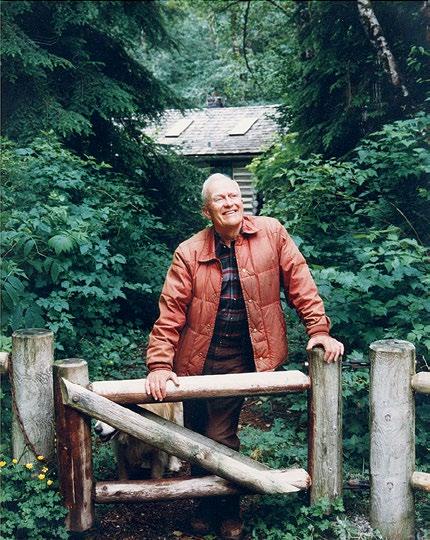 Above: University of Washington regent Jim Ellis talks to UW students, Seattle, 1971
Right: Jim Ellis outside cabin, near Upper Preston, 1997
Above: University of Washington regent Jim Ellis talks to UW students, Seattle, 1971
Right: Jim Ellis outside cabin, near Upper Preston, 1997
4 Fall 2023 u niversity of Washington Press
Facing page: Jim Ellis, Seattle, 1965
A Will to Serve
Stories of Patience, Persistence, and Friends Made Along the Way
Jim Ellis and Jennifer Ott
Foreword by Sally Jewell / Afterword by Gary Locke
the autobiogra P hy of an indefatigable visionary and C itizen a C tivist
Jim Ellis was one of the most influential and impactful civic leaders of Seattle’s and Washington’s recent history. Though he never sought elected office, his vision and drive were a key force behind many major projects defining our city, county, and region from the 1950s through today. From cleaning up Lake Washington, establishing King County Metro, and implementing the broad array of community-centered Forward Thrust improvement initiatives, to forward-thinking regional projects like the Mountains to Sound Greenway and the Washington State Convention Center, Ellis was astute at bringing together leaders across political divides to create consensus and effect change.

A Will to Serve is a story about the interconnectivity of Ellis’s personal and civic lives. It’s about individual people—family, friends, neighbors, colleagues—their shared challenges, and how they worked together for regional progress. The book provides insight into a tumultuous and dynamic period of our regional history and a window into the value of patience, persistence, and vision.
Ellis kept notes on his life, projects, and experiences and built a deep portfolio of public speeches. He drew from these to shape his detailed and engaging autobiography. A Will to Serve, in Ellis’s own words, is introduced and framed by former secretary of the interior and Jim Ellis mentee Sally Jewell. Several key accomplishments of his later life are presented by historian Jennifer Ott. It closes with an afterword by former Washington governor Gary Locke.
Jim Ellis (1921–2019) was a citizen activist for more than half a century. Jennifer Ott is an environmental historian and assistant director of HistoryLink. Sally Jewell is chair of the EarthLab Advisory Council at the University of Washington and former US secretary of the interior. Gary Locke is acting president of Bellevue College, former US secretary of commerce, and former governor of Washington State.
distributed for historylink
u niversity of Washington Press F all 2023 5
november 416 pp., 90 b&w illus., 6 × 9 in. $29.95 / £22.99 hC / 9781933245706 Autobiography / Pacific Northwest History



6 Fall 2023 u niversity of Washington Press
Illustration of a Columbian mammoth, Mammuthus columbi, by Julio Lacerda commissioned for the Burke Museum, used with permission; birch leaves from Stonerose sediment; Canadoceras newberryanum fossil
Spirit Whales and Sloth Tales

Fossils of Washington State
Elizabeth A. Nesbitt and David B. Williams
a guide to dis C overing the fas C inating natural history beneath your feet
From trilobites near the Idaho border and primitive horses on the Columbia Plateau to giant bird tracks near Bellingham and curious bear-like beasts on the Olympic Peninsula, fossils across Washington State are filled with clues of past life on Earth. With abundant and well-exposed rock layers, the state has fossils dating from Ice Age mammals only 12,000 years old back to marine invertebrates more than 500 million years old.
In Spirit Whales and Sloth Tales, renowned paleontologist Elizabeth A. Nesbitt teams up with popular science writer David B. Williams to offer a fascinating, richly illustrated tour through more than a half billion years of natural history. Following an introduction to key concepts, twenty-four profiles—each featuring a unique plant, animal, or environment—tell the incredible stories of individual fossils, many of which are on display in Washington museums. The spectacular paleontology of Washington State is brought to life with details of the fossils’ discovery and extraction, their place in geological time, and the insights they provide into contemporary issues like climate change and species extinction.
• Features profiles of the state’s best-known fossils, including the SeaTac sloth (Megalonyx jeffersoni) and the Blue Lake rhino (Menoceras barbourin)
• Details the tools and technologies of paleontology from radiometric dating to dna analysis
Elizabeth A. Nesbitt is curator emerita of invertebrate and micropaleontology at the Burke Museum and associate professor of earth science at the University of Washington. Her distinguished scientific contributions to the paleontology of the Pacific Northwest have earned many awards and honors, including having a whale named for her, the Maiabalaena nesbittae.
David B. Williams is a naturalist, author, and educator. His many books include the award-winning Homewaters: A Human and Natural History of Puget Sound and Too High and Too Steep: Reshaping Seattle’s Topography.
o C tober
224 pp., 40 color illus., 40 b&w illus., 2 maps, 6 × 9 in.
$24.95 / £18.99 Pb / 9780295752327
$24.95 / £18.99 eb / 9780295752334
Paleontology / Pacific Northwest
A Ruth Kirk Book
P ublished W ith the burke museum u niversity of Washington Press F all 2023 7
Taking to the Air
An Illustrated History of Flight

Lily
Ford
224 pp., 200 color illus., 6.5 × 9.5 in.
$24.95 P b / 9780295746784
F or sale only in the united states and C anada
“For many, flight has become a mundane, even actively unpleasant experience. . . . The great joy of this book is to be reminded what a romantic idea it is.”
—Telegraph
Taking to the Air tells the history of flight through the eye of the spectator and, later, the passenger. Focusing on moments of great cultural impact, the book is a visual celebration of the wonder of flight, based on the large and diverse collection of print imagery held by the British Library.
Sailor Song
The Shanties and Ballads of the High Seas

Gerry Smyth
Illustrated by Jonny Hannah
160 pp., 80 color illus., 6 × 8.5 in.
$22.95 h C / 9780295747286
F or sale only in the united states and C anada
“The book is simply suffused with an inviting friendliness—compelling original and period illustrations, easy-to-read musical notation, and scads of collected verses plus historical background for nearly every song.” Journal of Folklore Research

Passed down in the oral tradition and sung as working songs, sea shanties tell the compelling human stories of life on the water: hard labor, battling the elements, pining for distant loves and far-away homes. The music’s rhythms are designed to galvanize the group effort of heaving, pushing, and pulling to weigh anchor, wind rope around a capstan, or set sail. Acclaimed shanty devotee Gerry Smyth presents the context and background to each shanty alongside musical notation.
The Story of Propaganda in 50 Images
David Welch
144 pp., 68 color illus., 8.5 × 6 in.
$24.95 h C / 9780295751283
F or sale only in the united states and C anada
“This is a tremendous book and beautifully designed. It condenses immense wisdom into a small, perfectly curated collection of images each accompanied by incisive explanation and illuminating analysis.” —Tim Luckhurst
The Story of Propaganda in 50 Images is a chronological and international look at how important messages have been conveyed across centuries and cultures, through coins and monuments to paintings, posters, and films. The selection has been carefully curated to reveal, and to place in meaningful context, both negative and positive propaganda, from provoking hate to promoting public health, and provides a fascinating insight into how humankind can be seduced through slogans.
also P ublished W ith the british library
8 Fall 2023 u niversity of Washington Press
Serpent, Siren, Maelstrom, and Myth

Sea Stories and Folktales from Around the World
Gerry Smyth
an entran C ing C olle C tion of myths and legends of the sea
The sea is beautiful and alluring, but it is also dangerous and deadly. Above all, it is unknowable and untamable. Storytelling offered our ancestors a means to understand and interact with the natural world, and in time these stories coalesced into the mythological systems of the world. And the ocean features in every mythological system in history.
To reflect and explore this phenomenon, Gerry Smyth gathers together myths and folktales from cultures around the world: Native American, Caribbean, Polynesian, Persian, Indian, Scandinavian, and European. Just as these stories have been passed down through generations, he brings his own narrative interpretation with additional discussion on their meaning. Stories are divided into seven sections—Origin Stories; Gods and Humans; Voyages; Lost Places, Imagined Spaces; Weather and Nature; Down to the Sea in Ships; and Fabulous Beasts—and embellished with artworks, paintings, medieval illuminations, maps, and sailor sketches drawn from the wide-ranging collections of the British Library.
Gerry Smyth is a musician, actor, playwright, and professor of Irish cultural history at Liverpool John Moores University. He is author of the best-selling Sailor Song: The Shanties and Ballads of the High Seas.
o C tober
384 pp., 200 color illus., 6 × 9 in. $29.95 hC / 9780295752310
Literature
north ameri C an rights only
P ublished W ith the british library
u niversity of Washington Press F all 2023 9
The Whale and the Cupcake
Stories of Subsistence, Longing, and Community in Alaska
Julia O’Malley
Foreword by Kim Severson
176 pp., 80 color illus., 1 map, 6.5 × 9 in.
$24.95 P b / 9780295746142
“A thoughtful and enticing culinary text.” Foreword Reviews
“Through this book, [O’Malley] doesn’t merely introduce us to Alaskan foods, she discovers the soul of Alaska itself.”
Anchorage Daily News
Touching on issues of subsistence, climate change, cultural mixing and remixing, innovation, interdependence, and community, The Whale and the Cupcake reveals how Alaskans connect with the land and each other through food. Features interviews, photographs, and recipes by James Beard Award–winning journalist and third-generation Alaskan Julia O’Malley.

The $16 Taco
Contested Geographies of Food, Ethnicity, and Gentrification

Pascale Joassart-Marcelli
288 pp., 7 b&w illus., 10 maps, 2 tables, 6 × 9 in.
$30.00s P b / 9780295749280
“Offers a contextualized and complex account of the making and remaking of urban spaces through food, and avoids romanticizing or dismissing the everyday practices of local residents.”
AAG Review of Books
“Makes a useful contribution to the literature on urban evolution and the processes—demographic, political, and financial— that perpetuate cycles of neighborhood ascension, decline, and gentrification.” Journal of Urban Affairs
White middle-class eaters are increasingly venturing into historically segregated neighborhoods in search of “authentic” eateries run by—and for—immigrants and people of color. Pascale Joassart-Marcelli traces the transformation of three urban San Diego neighborhoods whose foodscapes are shifting from serving the needs of longtime minoritized residents who face limited food access to pleasing the tastes of wealthier and whiter newcomers.
also of interest
10 Fall 2023 u niversity of Washington Press
Hatched
Dispatches from the Backyard Chicken Movement
Gina G. Warren
2022 inde P endent P ublisher book a W ard for animals/ P ets (gold)
“Chickens are a lot more mainstream than veganism and a little bit like kombucha: super weird twenty years ago, now somewhat popular and made even more so by logos, brands, and hashtags.” So begins Gina Warren’s deep dive into the backyard chicken movement. Digging into its history and food politics, she provides a highly personal account of the movement’s social and cultural motivations, the regulations it faces, and the ways that chicken owners build community. Weaving together interviews with urban agriculture advocates, entrepreneurs such as a $225 per hour “chicken consultant,” animal rights campaigners, and a fabulous cross-section of chicken enthusiasts, Warren sheds light on Americans’ complex relationship with animals—as guardians, companions, and eaters—and what it means to be a conscious eater.
As Warren chronicles her own misadventures raising chickens, her pursuit of what’s best for her own flock leads past chicken tutus and gourmet chicken treats and into serious attempts at sustainable eating, such as cooking insects and dumpster diving. The result is a fresh and charming story that speaks to backyard chicken owners, while also raising questions about sustainable farming, industrial agriculture, and our connections with the animals we love.
“Demonstrates thoughtful grappling with what it means to be an ethical eater in a capitalist society.” —New Books Network
Hatched is Gina Warren’s exceptionally thoughtful account of raising backyard chickens from chicks to dinner, with dumpster diving in between—actions that reflect her deep respect and care for the animals we eat and her profound commitment to living ethically.” —Marion Nestle, author of Food Politics: How the Food Industry Influences Nutrition and Health

“[An] entertaining, thoughtfully earnest book . . . a very accessible rendering of a topic that reflects larger issues in the US food production industry.” —Choice
Gina G. Warren writes about animals, the natural world, and human relationships for publications such as Orion, Creative Nonfiction, and Terrain .org. She raises a small flock of chickens in her neighborhood backyard.
august
272 pp., 5.5 × 8.5 in.
$24.95 / £18.99 Pb / 9780295752198
Food / Nature and Environment / Memoir
ne W in Pa P erba C k
u niversity of Washington Press F all 2023 11
Charged
A History of Batteries and Lessons for a Clean Energy Future
 James Morton Turner
Foreword by Paul S. Sutter
James Morton Turner
Foreword by Paul S. Sutter
g old aW ard Winner in the g reen, r estorative Pra C ti C es/ s ustainability Category, n autilus b ook aW ards
To achieve fossil fuel independence, few technologies are more important than batteries. Used for powering zero-emission vehicles, storing electricity from solar panels and wind turbines, and revitalizing the electric grid, batteries are essential to scaling up the renewable energy resources that help address global warming. But given the unique environmental impact of batteries—including mining, disposal, and more—does a clean energy transition risk trading one set of problems for another?
In Charged, James Morton Turner unpacks the history of batteries to explore why solving “the battery problem” is critical to a clean energy transition. As climate activists focus on what a clean energy future will create—sustainability, resiliency, and climate justice—the history of batteries offers a sharp reminder of what building that future will consume: lithium, graphite, nickel, and other specialized materials. With new insight on the consequences for people and communities on the front lines, Turner draws on the past for crucial lessons that will help us build a just and clean energy future, from the ground up.
“An eminently readable, elegantly precise treatise on the topic of batteries.” —Science Charged is history that can make history. Turner’s brilliant book will help with one of the great challenges of our time—the transition to a sustainable energy system. Full of arresting insights, written with grace and verve, Charged ends with smart suggestions about what still needs to change for batteries to drive a greener future. It’s a model for historians who aim to shape contemporary debate about pressing issues and a must-read for everyone working to move the world beyond fossil fuels.” —Adam Rome, author of The Genius of Earth Day: How a 1970 Teach-In Unexpectedly Made the First Green Generation
James Morton Turner is professor of environmental studies at Wellesley College. He is author of The Promise of Wilderness: American Environmental Politics since 1964 and coauthor of The Republican Reversal: Conservatives and the Environment from Nixon to Trump.
ne W in Pa P erba C k may 256 pp., 12 b&w illus., 6 × 9 in. $24.95 / £18.99 Pb / 9780295752181 Environmental History / Science and Technology Studies weyerhaeuser environmental books 12 Fall 2023 u niversity of Washington Press
Capturing Glaciers
A History of Repeat Photography and Global Warming
Dani Inkpen
Foreword by Paul S. Sutter
Photographs do not simply speak for themselves. Their meanings are built through interpretive frameworks that shift over time. Today, photographs of receding glaciers are one of the most well recognized visualizations of human-caused climate change. These images, captured through repeat photography, have become effective with an unambiguous message: global warming is happening, and it is happening now. But this wasn’t always the case. The meaning and evidentiary value of repeat glacier photography has varied over time, reflecting not only evolving scientific norms but also social, cultural, and political influences.
In Capturing Glaciers, Dani Inkpen historicizes the use of repeat glacier photographs, examining what they show, what they obscure, and how they influence public understanding of nature and climate change. Though convincing as a form of evidence, these images offer a limited and sometimes misleading representation of glaciers themselves. Furthermore, their use threatens to replicate problematic ideas baked into their history. With clear and compelling writing, Capturing Glaciers ultimately calls for a centering of climate justice and warns of the consequences of reducing the problem of global warming to one of distant wilderness.

“Topical, carefully researched, and delightfully narrated.” —Joshua P. Howe, author of Behind the Curve: Science and the Politics of Global Warming
“A fabulous and inspiring book that adds a crucial voice in today’s climate change discussions.” —Mark Carey, author of In the Shadow of Melting Glaciers: Climate Change and Andean Society
Dani Inkpen is assistant professor of history at Mount Allison University.
de C ember
248 pp., 26 b&w illus., 2 maps, 6 × 9 in.
$105.00x / £84.00 hC / 9780295752013
$30.00s / £22.99 Pb / 9780295752020
$30.00s / £22.99 eb / 9780295752037
Environmental History / Science and Technology Studies weyerhaeuser environmental books
ex
P lores the P hotogra P hy of C limate C hange
u niversity of Washington Press F all 2023 13
Wide-Open Desert
A Queer History of New Mexico
Jordan Biro Walters
304 pp., 24 b&w illus., 6 × 9 in.
$30.00s P b / 9780295751023
“Biro Walters takes queerness on the road in the land of enchantment, telling a compelling story of how urban and rural New Mexico served as loci for individual sexual awakenings and national discussions of sexual freedom.” —Flannery Burke, author of A Land Apart: The Southwest and the Nation in the Twentieth Century

“Provides a beautifully nuanced analysis of the complexities of LGBTQ+ history in the geopolitical and cultural borderlands of New Mexico.” —Rebecca Scofield, author of Outriders: Rodeo at the Fringes of the American West
Wide-Open Desert brings to life a vibrant milieu of two-spirit, Chicana lesbian, and white queer cultural producers in the heart of the US Southwest.
Love Your Asian Body
AIDS Activism in Los Angeles
Eric C. Wat
304 pp., 13 b&w illus., 6 × 9 in.
$29.95 P b / 9780295749334
“An inspiring work that deserves to be read as it is an integral piece towards understanding the queer Asian American struggle for sexual liberation and health equity.” International Examiner

A community memoir, Love Your Asian Body connects the deeply personal with the uncompromisingly political in telling the stories of more than thirty Asian American AIDS activists. In the early years of the epidemic, these activists became caregivers, social workers, nurses, researchers, and advocates for those living with HIV. And for many, the epidemic sparked the beginning of their continued work to build multiracial coalitions and confront broader systemic inequities.
Outriders
Rodeo at the Fringes of the American West

Rebecca Scofield
264 pp., 15 b&w illus., 6 × 9 in.
$27.95 P b / 9780295746777
“An engaging, insightful, wonderfully researched social and cultural study of forgotten or ignored participants in United States rodeo.”
Great Plains Quarterly
“Provocative and contributes a framework for revisiting fringe groups.”
Pacific Northwest Quarterly
how women, Blacks, gay men, and incarcerated men have chosen the cowboy as a symbol of what it means to be authentically American.”
Journal of Popular Culture
Outriders explores the histories of rodeoers at the margins of society, from female bronc-riders in the 1910s and 1920s and convict cowboys in Texas in the mid-twentieth century to all-black rodeos in the 1960s and 1970s and gay rodeoers in the late twentieth century.
also of interest
“Demonstrates
14 Fall 2023 u niversity of Washington Press
Slapping Leather
Queer Cowfolx at the Gay Rodeo
Elyssa Ford and Rebecca Scofield
una P ologeti C ally brings gay rodeo out of the C loset
Campy and competitive, gay rodeo offers a community of refuge that straddles the urban and rural. Since the mid-1970s, gay rodeos have provided space to both embrace and challenge the idealized masculinity associated with the iconic cowboy of the US West. Slapping Leather traces the history and growth of gay rodeo over the decades, demonstrating how queer cowfolx have fought to build a community where lgbtq+ people can escape discrimination in both mainstream rodeos and broader society.
Yet not all lgbtq + groups have found full acceptance in gay rodeo. Originally formed by gay men for gay men, the rodeo has at times perpetuated historically problematic ideas about the US West, the iconic cowboy, and the meaning of masculinity. Despite the gay rodeo’s credo of acceptance, its history reveals complicated relationships with straight rodeo, gender stereotypes, and women competitors. Drawing from multiple archives and over seventy oral history interviews, historians Elyssa Ford and Rebecca Scofield demonstrate how amid these tensions, participants, volunteers, and spectators continue to redefine the performance of the cowboy and national belonging.
“Through a range of sources, including myriad personal stories, Ford and Scofield chart an alternately triumphal and agonizing history of the gay rodeo from its rise in the 1970s, to its peak of popularity in the 1990s, to its slow decline in the new millennium. Along the way they consider the effects of the aids epidemic, culture wars, shifting gender norms and questions of inclusion, generational change, and the enduring myths of the Old West. This long-overdue study solidifies the authors’ reputations as the leading historians of the American rodeo scene’s marginalized members.” —Peter Boag, author of Pioneering Death: The Violence of Boyhood in Turn-of-the-Century Oregon

Elyssa Ford is associate professor of history at Northwest Missouri State University and author of Rodeo as Refuge, Rodeo as Rebellion: Gender, Race, and Identity in the American Rodeo. Rebecca Scofield is associate professor of American history at the University of Idaho and author of Outriders: Rodeo at the Fringes of the American West.
november
272 pp., 25 b&w illus., 1 map, 1 table, 6 × 9 in.
$105.00x / £84.00 hC / 9780295752129
$29.95 / £22.99 Pb / 9780295752136
$29.95 / £22.99 eb / 9780295752143
Women’s, Gender, and Sexuality Studies / Western History / Sports
u niversity of Washington Press F all 2023 15
november
200 pp., 2 b&w illus., 6 × 9 in.
$105.00x / £84.00 hC / 9780295751931
$30.00s / £22.99 Pb / 9780295751948
$30.00s / £22.99 eb / 9780295751955
Women’s, Gender, and Sexuality Studies / Science and Technology Studies / Anthropology feminist technosciences
Hacking the Underground
Disability, Infrastructure, and London’s Public Transport System

Raquel
Velho
reveals ho W kno W ledge from the margins sha P es infrastru C tures
“Minding the gap” while using a wheelchair on the London Underground goes beyond a sharp eye and careful foot placement to avoid a fall: it can entail carrying and deploying a portable ramp to embark and disembark or carefully mapping out a custom route ahead of time. The extensive infrastructure of London’s public transportation system requires constant improvisation from users who move through the system differently than nondisabled people do. Centering the voices of disabled passengers, Hacking the Underground highlights how marginalized groups subvert and ultimately transform infrastructures, actively shaping them.
Raquel Velho draws on emancipatory action research in London, capturing the hegemonic character of infrastructures without losing the experiences and actions of marginalized users. Proposing a crip feminist and profoundly relational approach to infrastructure, Velho illustrates how the built environment holds the potential for both inclusionary and exclusionary world-building.
“Beautifully written and remarkable in its conceptualization of infrastructure. Disability studies and science and technology studies have long needed a book exactly like this.” —Aimi Hamraie, author of Building Access: Universal Design and the Politics of Disability
“Velho captures the texture of daily living in relation to public transportation (and lack thereof). Hacking the Underground will be of great interest to many, including disabled people, disability activists, allies, designers, planners, and organizers.” —Alison Kafer, author of Feminist, Queer, Crip
Raquel Velho is assistant professor of science and technology studies at Rensselaer Polytechnic Institute.
16 Fall 2023 u niversity of Washington Press
Queer Data Studies
Edited by Patrick Keilty
untangles ho W data sha P es and is sha P ed by queer W orlds
Data, perilous and powerful, is both a worldmaking and a dismantling force. The collection of data about queer lives and bodies, the consequences of data analysis for queer subjects, and considerations of privacy and consent often present ethical dilemmas even as queer data expands our understanding of who and what counts. The need for queer analyses and perspectives has taken on a new sense of urgency in light of hostile anti-queer policies by major technology companies, the security theater of airports, the disproportionate rates of policing queer people and people of color, digital surveillance in border security, and the proliferation of digital health records.
Gathering wide-ranging interdisciplinary conversations into one rich volume, Queer Data Studies challenges readers to rethink how the extraction, circulation, modeling, governance, and use of data affects queer subjects and, at the same time, to consider how the power of data might be harnessed in the service of queer ethics. Contributors take a capacious approach to data, drawing from a range of sources, including stories, sounds, medical data, police data, maps, and algorithmic modeling. This anthology engages intersectional, decolonial, feminist, queer, and trans research, advancing ongoing dialogues about data across the social sciences, humanities, and applied sciences.

“Through a series of daring, original, important case studies, Queer Data Studies proposes a novel concept that fundamentally challenges each of the terms it brings together. How can data be queer if queerness resists categorization and data demands categories? Timely, well researched, socially engaged, and overall a fantastic contribution to the fields of media studies, queer theory, and algorithmic analysis.”—micha cárdenas, author of Poetic Operations: Trans of Color Art in Digital Media
Patrick Keilty is associate professor in the Faculty of Information and the Cinema Studies Institute at the University of Toronto. He is coeditor of Feminist and Queer Information Studies Reader.
november
280 pp., 7 b&w illus., 2 tables, 6 × 9 in. $105.00x / £84.00 hC / 9780295751962
$30.00s / £22.99 Pb / 9780295751979
$30.00s / £22.99 eb / 9780295751986
Science and Technology Studies / Women’s, Gender, and Sexuality Studies
feminist technosciences
Contributors Ryan Conrad, Mathew Gagné, Gary Kafer, Harris Kornstein, Shaka McGlotten, Stephen Molldrem, Susanna Paasonen, Nikita Shepard, Jenny Sundén, Suisui Wang, and Lina Žigelytė
u niversity of Washington Press F all 2023 17
Barbara Earl Thomas
The Geography of Innocence
Catharina Manchanda, Halima Taha, and Barbara Earl Thomas
Barbara Earl Thomas’s new body of work carries within it the sediments of history and grapples with race and the color line. At the heart of it lies a story of life and death, hope and resilience—a child’s survival. With her quietly glowing portraits of young Black boys and girls, Thomas puts before us the humble question: can we see, and be present to, the humanity, the trust, the hopes and dreams of each of these children?

The Geography of Innocence offers a reexamination of Black portraiture and the preconceived dichotomies of innocence and guilt and sin and redemption, and the ways in which these notions are assigned and distorted along cultural and racial lines. Two interconnected visual arguments unfold: a portrait gallery of children from the artist’s extended community and an illuminated environment that appears like a delicate paper lantern. To accompany the visual elements, the book’s essays examine Thomas’s work in the context of different art historical portraiture traditions and political relevance. Thomas also contributes an interview and an essay reflecting on the current climate in which the work exists.
Catharina Manchanda is Jon and Mary Shirley Curator of Modern and Contemporary Art at the Seattle Art Museum. Halima Taha is an adjunct faculty member at Bloomfield College. Barbara Earl Thomas is a Seattlebased artist whose work has been widely exhibited throughout the United States.
also featuring the W ork of barbara earl thomas available 80 pp., 30 color illus., 8.5 × 10 in. $24.95 Pb /
Art / African American Art 18 Fall 2023 u niversity of Washington Press
9780932216786
Barbara Earl Thomas
The Illuminated Body
Edited by Carolyn Swan Needell
With Contributions by Barbara Earl Thomas, Carolyn Swan Needell, Kemi Adeyemi, and Emily Zimmerman
features W ork a C ross a W ide range of artisti C mediums, in C luding Pa P er, glass, and tyvek
A talented visual storyteller, Barbara Earl Thomas has drawn from history, literature, folklore, mythology, and biblical stories over her forty-year career to reflect the social fabric of our times. Thomas’s figural and narrative imagery has a deeply philosophical and emotional force, and light and dark have been especially potent concepts in her work. This book of new works meditates on the visual experience of the body within a physical and metaphorical world of light and shadow. Based on real people, the portraits “elevate to the magnificent” her family, friends, and neighbors, as well as cultural icons of the African American literary landscape. Thomas’s illumination of the human figure through her lightfilled artworks and portraiture encourages the viewer to reflect on how we communicate ourselves to the world and how we perceive those among us.
Carolyn Swan Needell is the Carolyn and Richard Barry Curator of Glass at the Chrysler Museum of Art in Norfolk, Virginia. Kemi Adeyemi is associate professor of gender, women, and sexuality studies at the University of Washington in Seattle. Emily Zimmerman is assistant director of the Arthur Ross Gallery at the University of Pennsylvania. Barbara Earl Thomas is a Seattle-based artist whose work has been widely exhibited throughout the United States.
o C tober
64 pp., 37 color illus., 8 × 10.5 in.
$24.95 / £18.99 Pb / 9798987929315
Art / African American Art
Exhibition Dates: Chrysler Museum of Art, February 24–August 20, 2023
Wichita Art Museum, October 7, 2023–January 14, 2024
Arthur Ross Gallery, the University of Pennsylvania, February 17–May 21, 2024

distributed for the C hrysler museum of art
u niversity of Washington Press F all 2023 19
Frisson

The Richard E. Lang and Jane Lang Davis Collection
Edited by Catharina Manchanda
200 pp., 100 color illus., 9 × 10.5 in.
$45.00 h C / 9780932216793
Spanning 1945 through 1976, the paintings, drawings, and sculptures in Frisson serve as significant examples of mature works and pivotal moments of artistic development from some of the most influential American and European artists of the postwar period, including Francis Bacon, Lee Krasner, Clyfford Still, Philip Guston, Joan Mitchell, David Smith, and others. Together they represent an inimitable archive of innovation and a cross-pollination of leading artistic positions in the postwar years. With twenty new scholarly essays written by leading experts, Frisson provides the first opportunity for in-depth research into and new insights about nineteen noteworthy artworks recently acquired by the Seattle Art Museum.
Monet at Étretat

Chiyo Ishikawa
80 pp., 50 color illus., 10.5 × 9.75 in.
$19.95 h C / 9780932216779
In this focused study, Chiyo Ishikawa places Monet’s Étretat works within the context of his artistic ambition and frustration at a key moment in his life and career. She also explores the changing relationship between society and landscape in late nineteenth-century France. The book features works by Monet and his contemporaries Gustave Courbet, Camille Corot, and Eugène Boudin, supplemented by photographs and ephemeral material to bring to life Monet’s experience in the region. The biographical context, in addition to the immersive visual experience, offers a vivid account of this significant aspect of Monet’s artistic progression.
also from the seattle art museum
20 Fall 2023 u niversity of Washington Press
Renegade Edo and Paris
Japanese Prints and Toulouse-Lautrec
Xiaojin Wu
With Contributions by Mary Weaver Chapin
a C riti C al look at the renegade s P irit that P ermeates ja Panese P rints and the P osters of fin-de-siè C le Paris
Both the Edo period (1603–1868) in Japan and the late nineteenth century in France witnessed a multitude of challenges to the status quo from the rising middle class. In Edo (present-day Tokyo), townspeople pursued hedonistic lifestyles as a way of defying the state-sanctioned social hierarchy that positioned them at the bottom. Their new pastimes supplied subject matter for ukiyo-e (pictures of the floating world). Many such pictures arrived in France in the 1860s, a time when French art and society were undergoing substantial changes. Fin-de-siècle Paris, like Edo before it, saw the rise of antiestablishment attitudes and a Bohemian subculture. As artists searched for fresh and more expressive forms, Henri de Toulouse-Lautrec (1864–1901) and his contemporaries were drawn to novel Japanese prints.
While ukiyo-e’s formal influences on Toulouse-Lautrec and his peers have been well studied, the shared subversive hedonism that underlies these artworks has been less examined. Through a wide selection of Japanese prints and Toulouse-Lautrec works, this book offers a critical look at the renegade spirit inhabiting the graphic arts in both Edo and Paris, highlighting the social impulses behind a burgeoning art production.

Xiaojin Wu is Luther W. Brady Curator of Japanese Art at the Philadelphia Museum of Art. Previously she was Atsuhiko and Ina Goodwin Tateuchi Foundation Curator of Japanese and Korean Art at the Seattle Art Museum. Mary Weaver Chapin is curator of prints and drawings at the Portland Art Museum.
/ 9780932216076
Art History / European Art / Asian Art Exhibition Dates: Seattle Art Museum, July 21–December 3, 2023
distributed for the seattle art museum july 104 pp., 70 color illus., 9.5 × 10.75 in. $30.00
Pb
/ £22.99
u niversity of Washington Press F all 2023 21
Invocation of Beauty

The Life and Photography of Soichi Sunami
David F. Martin
144 pp., 150 color illus., 8.5 × 11 in.
$29.95 h C / 9780998911212
Soichi Sunami, born in Japan, immigrated to the United States at the age of twenty. In Seattle, he studied with local artists including Fokko Tadama, Wayne Albee, Frank Asakichi Kunishige, and Ella McBride. After moving to New York in 1922, he attended the Art Students League and met numerous visual artists. He collaborated with Martha Graham, producing iconic images of her dance performances, and he became staff photographer at the Museum of Modern Art. Sunami produced thousands of large-format negatives for the MoMA archive and independently created an important body of work in the field of modern dance photography. This book includes Sunami’s rare, early pictorialist images of the Northwest landscape.

George Tsutakawa Early Works on Paper
David F. Martin
128 pp., 40 color illus., 40 b&w illus., 8.5 × 11 in.
$29.95 h C / 9780998911243
One of the leading Northwest artists of his generation, George Tsutakawa is internationally known for his sculpture and fountain designs. However, a lesser-known aspect of his career was the production of blockprints, watercolors, and works on paper that began in the 1920s and continued throughout his career. Drawn from the Tsutakawa estate, most of the works shown here have never been seen previously by the public. These early works display concepts and inspirations that would inform Tsutakawa’s aesthetic throughout a long and distinguished career. Contextual works by Tsutakawa’s instructors and contemporaries provides a broader understanding of his oeuvre.
Kenjiro Nomura, American Modernist
An Issei Artist’s Journey
Barbara Johns
Foreword by Gail M. Nomura
Contribution by David F. Martin
192 pp., 156 color illus., 8.5 × 11 in.

$39.95 h C / 9780998911236
Kenjiro Nomura, American Modernist presents Nomura’s life and artistic achievement within their historical context.
Barbara Johns’s account depicts Seattle as a stronghold of prewar Issei artistic activity, and Nomura’s work as providing a meaningful contribution to the history of American art. David F. Martin’s essay examines the trajectory of Nomura’s art from his early student days through four decades of artistic success placed within the cultural milieu of his regional contemporaries. The book is generously illustrated with artwork tracing Nomura’s entire career.
also from C as C adia art museum
22 Fall 2023 u niversity of Washington Press
Full Light and Perfect Shadow
The Photography of Chao-Chen Yang
David F. Martin
Celebrates the W ork of an influential asian ameri
This is the first study of the work of Chao-Chen Yang (1909–1969), an important Seattle photographer who gained national prominence in the mid-twentieth century.
Born in Hangzhou, China, Yang received his art training at the University of Hsin-Hwa in Shanghai. After graduating, he became art director for the Government Institute of Nanking. In 1933 he moved to Chicago as chancellor of the Chinese Consulate and attended the Art Institute of Chicago. Initially trained as a painter, he later used photography as his main medium for artistic expression. In 1938 Yang was transferred to Seattle as chancellor of the Chinese Consulate and became actively involved with the Seattle Photographic Society. He was also an influential art and photography instructor and worked tirelessly to advance Chinese culture in the United States. Yang won numerous awards in important photography salons and became a fellow of the Photographic Society of America, the Professional Photographers Association of America, and the Royal Photographic Society of Great Britain. He was a pioneer in color photography in the Northwest in both advertising and the fine arts.
David F. Martin is curator for Cascadia Art Museum and is the leading authority on early Washington State art and artists. His numerous publications have focused on regional painting, printmaking, sculpture, and photography. They include George Tsutakawa: Early Works on Paper and The Lavender Palette: Gay Culture and the Art of Washington State.
168 pp., 40 color illus., 60 b&w illus., 9 × 11.5 in.
$29.95 / £22.99 hC / 9780998911250
Photography / Pacific Northwest Art and Culture / Asian American Art
Exhibition Dates: Cascadia Art Museum, November 9, 2023–February 11, 2024

C an P
P
hotogra
her
distributed for C as C adia art museum
o C tober
u niversity of Washington Press F all 2023 23
february
248 pp., 16 color illus., 24 b&w illus., 6 × 9 in.
$105.00x / £84.00 hC / 9780295752099
$35.00s / £26.99 Pb / 9780295752105
$35.00s / £26.99 eb / 9780295752112
Women’s, Gender, and Sexuality Studies / Visual Studies / Performing Arts
Art, Activism, and Sexual Violence
Edited by Sally L. Kitch and Dawn R. Gilpin
highlights the role of C reative ex P ression in ex P osing, P reventing, and C ombatting sexual violen C e
Since 2017 the #MeToo movement has expanded cultural awareness of the pervasiveness of sexual assault and tacit support for rape culture in the United States and beyond. Despite its ubiquity, sexual assault is one of the most underreported crimes in the world in part because of the mistreatment and misunderstanding survivors often face from their communities and the legal system.
Art, Activism, and Sexual Violence brings together creative work, in multiple genres, with analyses of the historical and cultural contexts of sexual violence from intersectional feminist perspectives. Together, contributors illuminate the power of artists—as victims, survivors, and allies—to combat sexual violence through creative expression in partnership with historians, anthropologists, sociologists, journalists, and gender scholars. Showcasing dance, textile arts, painting, new media images, drama, and other creative forms, this volume embraces artistic expression’s transformative potential and inspires readers to action, mutual recognition, resistance, and resilience.

“Attentive, accessible, and sensitive writing that not only engages with a range of issues related to sexual violence but genuinely bears witness via the writing.”
—Basia Sliwinska, editor of Feminist Visual Activism and the Body
Contributors Stephanie Leigh
Batiste, Elaina Behounek, Sydney
Burrows, Alesha Durfee, Jasmin M.
Goodman, Clarity Haynes, Luzene Hill, Jennifer Karash-Eastman, Elizabeth Johnson Levine, Ruta Butkus Marino, Deborah Martin, Nicola Olsen, Jennifer Patterson, Emily Bonistall Postel, Sean
Shannon, Deborah Shaw, Susanne
Slavick, Wei Sun, Steven Tepper, Leslie-Jean Thornton, and Nik Zaleski
“This diverse cohort of scholars, administrators, artists, and makers have collectively excavated how activism and art serve as a social force in facing the impacts of sexual assault and shame. This significant work should serve as a template for educators, activists, curators, and organizers to engage innovatively with their publics and think about the power of arts advocacy in our everyday lives.” —Hinda Mandell, author of Sex Scandals, Gender, and Power in Contemporary American Politics
Sally L. Kitch is University and Regents Professor of Women’s and Gender Studies at Arizona State University. Her many books include Contested Terrain: Reflections with Afghan Women Leaders and The Specter of Sex: Gendered Foundations of Racial Formation in the United States. Dawn R. Gilpin is assistant dean and associate professor at Arizona State University’s Walter Cronkite School of Journalism and Mass Communication. She is coauthor of Crisis Management in a Complex World.
A Samuel and Althea Stroum Book
24 Fall 2023 u niversity of Washington Press
Resisting the Nuclear
Art and Activism across the Pacific
 Edited by Elyssa Faison and Alison Fields
Edited by Elyssa Faison and Alison Fields
From uranium mines on the Navajo Nation to craters caused by nuclear testing on the Bikini and Enewetak Atolls, the production and deployment of nuclear weapon technologies have disproportionately harmed Indigenous lands. Sustained exposure to radiation from nuclear weapons and waste affects many communities from Japan to Oceania to the US West. While antinuclear activism often takes political and legal forms, artistic responses to nuclear regimes also prompt social action and resistance.
Resisting the Nuclear is an interdisciplinary edited collection featuring historians, anthropologists, artists, and activists who explore the multifaceted forms of resistance to nuclear regimes. Through a combination of interviews, scholarly essays, and discussions of contemporary art, contributors recenter the victims of nuclear technologies and demonstrate how political and artistic expression can respond to nuclear threats and effect change.
“Reshapes geographies of what we might consider affected by the nuclear, refocusing discussion onto the Marshall Islands and American West and, critically, the Indigenous people in those locations.” —Jessica Nakamura, author of Transgenerational Remembrance: Performance and the Asia-Pacific War in Contemporary Japan
“Essential reading—informative, insightful, revealing, and timely. An important invitation to remember lives lost and impacted by nuclear disasters and to pause and review the ways nuclear power has been mobilized in relation to US imperialism and racial-settler capitalism.” —Susette Min, author of Unnamable: The Ends of Asian American Art
Elyssa Faison is L. R. Brammer Jr. Presidential Professor and associate professor of history at the University of Oklahoma and author of Managing Women: Disciplining Labor in Modern Japan. Alison Fields is Mary Lou Milner
Carver Professor of Art of the American West and associate professor at the University of Oklahoma and author of Discordant Memories: Atomic Age Narratives and Visual Culture.
february
328 pp., 18 color illus., 32 b&w illus., 1 map, 7.25 × 9 in.
$35.00s / £26.99 Pb / 9780295752341
$35.00s / £26.99 eb / 9780295752358
Visual Studies / History / Asian Studies / Asian American Studies / Native American and Indigenous Studies
critical ethnic studies and visual culture
A Samuel and Althea Stroum Book
Contributors Melanie Armstrong, Holly Barker, Peter Goin, Margo Machida, Yuka Tsuchiya Moriguchi, Jennifer Richter, Shinpei Takeda, Seiichirō Takemine, Akiko Takenaka, Naoko Wake, Sherri Wasserman, and Ran Zwigenberg
trans Pa C ifi C tour of nu C
a
lear humanities
u niversity of Washington Press F all 2023 25

26 Fall 2023 u niversity of Washington Press
Huitte Facette (Octoportrait), 2009, by 2Fik
Queer World Making
Contemporary Middle Eastern Diasporic Art
Andrew Gayed
an abundantly illustrated look at ho W queerness is P erformed W ithin artisti
Premodern archives from the Middle East show rich and diverse homoerotic worlds that were disrupted by the colonial imposition of Western models of sexuality. Andrew Gayed traces how contemporary Arab and Middle Eastern diasporic artists have remembered and reinvented these historical ways of being in their work in order to imagine a different present. Building on global art histories and transnational queer theory, Queer World Making illuminates contemporary understandings of queer sexuality in the Middle Eastern diaspora. The author focuses on the visual works of artists who create political art about queer identity, including Jamil Hellu, Ebrin Bagheri, 2Fik, Laurence Rasti, Nilbar Güres, and Alireza Shojaian.
Through engaging with these artists, Gayed is seeking to articulate a Western and non-Western modernity that works beyond the dichotomy of sexual oppression, stereotypically associated with the Middle East, versus sexual acceptance, attributed to North American norms. Instead, Gayed traces how diasporic subjects create coming-out narratives and identities that provide alternatives to inscribed Western models. Queer World Making reframes Arab homosexualities in terms of desire and alternative gender norms rather than through Western notions of visibility and coming out, narratives that are not conducive to understanding how queer Arabs living in the West experience their sexuality.
“This remarkably interdisciplinary work on queer art from Middle Eastern and North African diasporas departs from auto-theory to make a crucial contribution to transnational queer studies. Through his own strategy of ‘queering locally’ and Piotr Piotrowski’s concept of ‘horizontal art histories,’ Gayed articulates very practical strategies for decolonizing the discipline of art history.”

—Jarrod Hayes, author of Queer Roots for the Diaspora: Ghosts in the Family Tree
Andrew Gayed is assistant professor of art history and visual culture at the Ontario College of Art and Design University (ocadu ).
february
328 pp., 47 color illus., 7.25 × 9 in.
$35.00s / £26.99 Pb / 9780295752297
$35.00s / £26.99 eb / 9780295752303
Art History / Middle East Studies / Women’s, Gender, and Sexuality Studies
critical ethnic studies and visual culture
A McLellan Book
C P ra C ti C e
u niversity of Washington Press F all 2023 27
august
104 pp., 5.25 × 8 in.
$19.95 / £14.99 Pb / 9780295752075
$19.95 / £14.99 eb / 9780295752082 Asian
Dancer Dawkins and the California Kid

Willyce Kim
Foreword by Eunsong Kim
a sa PP hi C novel ahead of its time that delights in queer joy, love, and adventure
Dancer Dawkins is a swift-footed, weed-smoking football stud. Her lover, Jessica, left their place in Los Angeles to join a Napa Valley cult, where she believes she has found salvation. Willie Guthrie, the cigar-smoking, self-proclaimed California Kid, collides with Dancer in San Francisco, and the two join forces to save Jessica from the clutches of cult leader Fatin Satin Aspen. Willyce Kim’s campy, women-centered Western novel is a celebration of queer joy. While her vibrant vignettes are filled with California whimsy through a kaleidoscope of food and sports metaphors, darker political undercurrents of the Vietnam War and the infamous Bohemian Grove inhabit this uncanny adventure. Buckle up for this wild, spunky, and unabashedly queer ride!
Dancer Dawkins and the California Kid stretches the limits of how queer forms and Asian American antagonisms have previously been examined. No politics is declarative, no identity stable. The work asks us to imagine how the Asian American writer may push us toward and against preexisting formations.”
—from the foreword by Eunsong Kim
“Kim’s writing certainly made clear the difference between merely describing lesbian relationships and delighting in them.” —Feminist Bookstore News
Willyce Kim is author of three poetry books, Curtains of Light, Eating Artichokes, Under the Rolling Sky, and two novels. She was an early member of the Women’s Press Collective in Oakland, California. Eunsong Kim is associate professor of English at Northeastern University and author of gospel of regicide and the forthcoming The Aestheticization of Property: Race and the Politics of Collecting
and Sexuality Studies / Fiction
of asian american literature
American Studies / Women’s, Gender,
classics
28 Fall 2023 u niversity of Washington Press
A Shawn Wong Book
The Unknown Great
Stories of Japanese Americans at the Margins of History
Greg Robinson
With Jonathan van Harmelen
an astounding ne W set of biogra P hi C al P ortraits in ja Panese ameri C an history
Through stories of remarkable people in Japanese American history, The Unknown Great illuminates the diversity of the Nikkei experience from the turn of the twentieth century to the present day. Acclaimed historian and journalist Greg Robinson delves into a range of themes from race and interracial relationships to sexuality, faith, and national identity. In accessible short essays drawn primarily from his newspaper columns, Robinson examines the longstanding interactions between African Americans and Japanese Americans, the history of lgbtq + Japanese Americans, religion in Japanese American life, mixed-race performers and political figures, and more. This collection is sure to entertain and inform readers, bringing fresh perspectives and unfamiliar stories from Japanese American history and centering the lives of unheralded figures who left their mark on American life.

“These biographical sketches show the wide-ranging experiences within each generation of Nikkei, appropriately complicating earlier totalizing descriptions of Issei, Nisei, and Sansei. It should be required reading for anyone seeking a fuller view of Nikkei life experiences.” —Karen M. Inouye, author of The Long Afterlife of Nikkei Wartime Incarceration
The Unknown Great is both critique and celebration. A must-read for anyone interested in uncovering the full range of experiences in the complexity and multiplicity that is Japanese America.” —Duncan Ryūkan Williams, author of American Sutra: A Story of Faith and Freedom in the Second World War
Greg Robinson is professor of history at l’Université du Québec à Montréal and author of several books, including The Unsung Great: Stories of Extraordinary Japanese Americans and After Camp: Portraits in Midcentury Japanese American Life Jonathan van Harmelen is a PhD candidate in history at the University of California, Santa Cruz.
november
296 pp., 18 b&w illus., 6 × 9 in.
$105.00x / £84.00 hC / 9780295751887
$30.00s / £22.99 Pb / 9780295751894
$30.00s / £22.99 eb / 9780295751900
Asian American Studies / History / Biography
Scott and Laurie Oki Series in Asian American Studies
u niversity of Washington Press F all 2023 29
november
232 pp., 22 b&w illus., 1 map, 6 × 9 in.
$105.00x / £84.00 hC / 9780295752068
$30.00s / £22.99 Pb / 9780295752051
$30.00s / £22.99 eb / 9780295752044
Asian American Studies / History / Asian Studies / China / Taiwan
Island X
Taiwanese Student Migrants, Campus Spies, and Cold War Activism
Wendy Cheng
illuminates a C old W ar trans Pa C ifi C drama
P layed out a C ross us C am P uses
Island X delves into the compelling political lives of Taiwanese migrants who came to the United States as students from the 1960s through the 1980s. Often depicted as compliant model minorities, many were in fact deeply political, shaped by Taiwan’s colonial history and influenced by the global social movements of their times. As activists, they fought to make Taiwanese people visible as subjects of injustice and deserving of self-determination.

Under the distorting shadows of Cold War geopolitics, the Kuomintang regime and collaborators across US campuses attempted to control Taiwanese in the diaspora through extralegal surveillance and violence, including harassment, blacklisting, imprisonment, and even murder. Drawing on interviews with student activists and extensive archival research, Wendy Cheng documents how Taiwanese Americans developed tight-knit social networks as infrastructures for identity formation, consciousness development, and anticolonial activism. Raising questions about historical memory and Cold War circuits of power, Island X is a testament to the lives and advocacy of a generation of Taiwanese American activists.
“A beautifully written book that foregrounds oral histories/biographies of Taiwanese students who engaged in activism and contextualizes their lives and experiences through infrastructures of activism and surveillance.” —Judy Tzu-Chun Wu, author of Radicals on the Road: Internationalism, Orientalism, and Feminism during the Vietnam Era
“The stories and political intrigue that fill the book’s pages are fascinating. I have been waiting for a long time for a book like Island X that covers Taiwanese American activism.” —Carolyn Chen, author of Getting Saved in America: Taiwanese Immigration and Religious Experience
Wendy Cheng is associate professor of American studies at Scripps College. She is author of The Changs Next Door to the Díazes: Remapping Race in Suburban California and coauthor of A People’s Guide to Los Angeles.
30 Fall 2023 u niversity of Washington Press
Taiwan Lives
A Social and Political History
Niki J. P. Alsford
stories of migration, dis P la C ement, demo C ratization, and transformation
A merchant, an exile, an activist, a pop star, a doctor, and a president are just some of the twenty-four individuals whose lives populate this people’s history of Taiwan. Ranging across time, social strata, ethnicity, and political alliance, these tales offer snapshots of historical eras and illustrate the interwoven fabric of colonialism.
Taiwan Lives is a comprehensive examination of the island’s rich and complex past, told through the voices and perspectives of the people who have lived it. From the indigenous peoples who have called Taiwan home for thousands of years to the four centuries of European, Manchu, Chinese, and Japanese colonization, this book delves into the diverse experiences and struggles of Taiwan’s inhabitants.
“An engaging and informative overview of Taiwan’s recent history that brings its varied historical residents to life and is unlike any book currently on the market.”
—Evan Dawley, author of Becoming Taiwanese: Ethnogenesis in a Colonial City, 1880s to 1950s
“Portraits narrated as tales of people in Taiwan weave a fresh and innovative expression of the island’s heritage and modern history.” —David Blundell, editor of Taiwan since Martial Law: Society, Culture, Politics, Economy
Niki J. P. Alsford is professor of Asia Pacific studies and head of Asia Pacific Institutes at the University of Central Lancashire. He is author of Transitions to Modernity in Taiwan: The Spirit of 1895 and the Cession of Formosa to Japan.

february
240 pp., 2 maps, 3 tables, 6 × 9 in.
$105.00x / £84.00 hC / 9780295752150
$32.00s / £24.99 Pb / 9780295752167
$32.00s / £24.99 eb / 9780295752174
Asian Studies / Taiwan / China
taiwan and the world
u niversity of Washington Press F all 2023 31
Spatial Dunhuang
Experiencing the Mogao Caves

Wu Hung
392 pp., 188 color illus., 1 map, 2 tables, 7 × 10 in.
$65.00s h C / 9780295750200
“A major concern of contemporary scholars is the lack of a book that can tell an interesting story about the history of the art of Mogao. Wu Hung writes one that is easy to read and at the same time offers an intellectual framework to approach the subject at both macro and micro levels.” —Hsueh-man Shen, author of Authentic Replicas: Buddhist Art in Medieval China
“‘The holy lanterns, when lit, look like a suspended river of stars.’ Wu Hung brings the Dunhuang Buddhist shrines vividly to life in extraordinary historical, literary, archaeological and iconographic detail, solving complex questions with clarity and precision.”
—Roderick Whitfield, coauthor of Cave Temples of Mogao at Dunhuang: Art and History on the Silk Road
“Reading this magnificently illustrated book by the world’s foremost scholar of Chinese art is like touring Dunhuang with an immensely learned and creative guide offering fresh insights at every step.” —Robert E. Harrist Jr., author of The Landscape of Words: Stone Inscriptions from Early and Medieval China
The Many Lives of the First Emperor of China
Anthony J. Barbieri-Low
360 pp., 18 color illus., 48 b&w illus., 2 maps, 7 × 10 in. $65.00s h C / 9780295750224
“Anthony J. Barbieri-Low’s The Many Lives of the First Emperor of China is evidence that historical ‘meta-analysis’ can produce a book as absorbing as a good narrative history . . . if you’ve ever stood agape at the material riches of the Terracotta Warriors or sunk deep into an armchair with a good work of historical fiction or biography, then this book is also for you.”

—Asian Review of Books
“Offers the most well-rounded depiction available in any language of the First Emperor’s personality, lifestyle, and historical era, as well as the subsequent narratives that for centuries shaped how his reign was understood.”
—Los Angeles Review of Books
“Like its predecessors, offers brilliant insights into the history of China, and into ways of doing history, by finding a useful perspective that was hitherto ignored.” Journal of Chinese History
also of interest
32 Fall 2023 u niversity of Washington Press
Life and Afterlife in Ancient China
 Jessica Rawson
Jessica Rawson
an e P i C ne W history of an C ient C hina told through the P rism of a dozen extraordinary tombs
The three millennia up to the establishment of the first imperial Qin dynasty in 221 bc cemented many of the distinctive elements of Chinese civilization still in place today: an extraordinarily challenging geography and environment; formidable infrastructure; a society based on the strict hierarchy of the family; a shared written script of characters; a cuisine founded on rice and millet; a material culture of ceramics, bronze, silk, and jade; and a unique concept of the universe, in which ancestors continue to exist alongside the living. Records of these early achievements and their diverse expressions often lie not in written history but in how people marked the end of their lives: their dwellings for the afterlife. Tombs and the treasures within them are almost the only artifacts to survive from Ancient China; their scale and sophistication rivals their equivalents in Ancient Egypt.
Jessica Rawson, one of the most eminent Western scholars of China, explores twelve grand tombs—each from a specific historical moment and place—showing how they reveal wider political, dynastic, and cultural developments, culminating in the lavish ambition of the First Emperor’s monument, guarded by his army of terracotta warriors. Beautifully illustrated and drawing on the latest archaeological discoveries, Life and Afterlife in Ancient China illuminates a constellation of beliefs about life and death and provides a remarkable new perspective on one of the oldest civilizations in the world.
Jessica Rawson is professor of Chinese art and archaeology and former warden of Merton College, Oxford. She was made honorary professor in the School of Archaeology and Museology at Peking University in 2019. She previously worked in the Department of Oriental Antiquities (now the Asia Department) at the British Museum and was lead curator for the exhibition China: The Three Emperors, 1662–1795 at the Royal Academy, bringing to London magnificent works of art from the Palace Museum in Beijing. For more than forty years, she has visited, researched, and lectured in most of China’s provinces. She was awarded the title of Dame in 2002 and received the Tang Prize in Sinology for “Giving Voice to Mute Objects” in 2022.
september
448 pp., 16 color illus., 130 b&w illus., 6 × 9.25 in.
$39.95 hC / 9780295752365
Asian Studies / China
north ameri C an rights only
u niversity of Washington Press F all 2023 33
Ceremonial Wine Vessel on Wheels, early eighteenth century.

34 Fall 2023 u niversity of Washington Press
Cloisonné enamel on copper alloy, 55 × 23 × 36.5 cm. Brooklyn Museum, Gift of Samuel P. Avery Jr., 09.513a-b.
Glorious Qing
Decorative Arts in China, 1644–1911
Claudia Brown
a guided tour through C enturies of exquisitely C rafted obje C ts
With over 250 color illustrations, this companion volume to Claudia Brown’s Great Qing: Painting in China, 1644–1911 covers an array of superbly crafted objects of art produced during China’s last dynasty. It features ceramics, metalwork, textiles, lacquer, glass, jade, and works of bamboo selected from collections in North America, Europe, China, and Taiwan. Art historian Brown probes the materials, motivations, technologies, and skills of Qing period artists, along with trends in art patronage and collecting. She considers objects of private patronage, including snuff bottles and instruments for the scholar’s desk, alongside imperial commissions, palace furnishings, and pieces made for export in the flourishing East-West trade market. Moving chronologically from one emperor’s reign to the next, Glorious Qing offers a comprehensive survey of Qing decorative arts that will delight experts and novices alike, from collectors to students of art history.
“A useful, concise, and well-illustrated introduction to the field of Chinese material and visual culture, focusing on the artistic production of luxury items and decorative objects throughout the Qing dynasty, and a long-overdue overview that presents a broad range of material.” —Clarissa von Spee, author of Wu Hufan: A Twentieth Century Art Connoisseur in Shanghai
“Comprehensive and concise . . . Brown’s lucid writing, weaving together almost all the media embraced in Qing dynasty decorative arts, is the first English-language text to explore this overlooked but fascinating topic.” —Pengliang Lu, associate curator of Chinese decorative arts, Metropolitan Museum of Art
Claudia Brown is professor of art history at Arizona State University and research curator for Asian art at the Phoenix Art Museum. She is author of Great Qing: Painting in China, 1644–1911.

february
226 pp., 277 color illus., 3 maps, 7 × 10 in.
$70.00s / £56.00 hC / 9780295751917
$70.00s / £56.00 eb / 9780295751924
Art History / Asian Art / China
A William Sangki and Nanhee Min Hahn Book
u niversity of Washington Press F all 2023 35
february
320 pp., 2 tables, 6.14 × 9.21 in.
$105.00x / £84.00 hC / 9780295752235
$32.00s / £24.99 Pb / 9780295752242
$32.00s / £24.99 eb / 9780295752259 Asian
Cold War Deceptions
The Asia Foundation and the CIA
David H. Price
investigates ho W the C ia tried to influen C e
During the early Cold War, the Central Intelligence Agency created dozens of funding fronts to support work that aligned with cia goals, from clandestine operations and research to liberal anticommunist programs. While investigative journalists and congressional inquiries exposed many of these fronts, little is known about their daily internal workings.
With a focus on the 1950s and 1960s Asia Foundation, Cold War Deceptions provides a rare view into the bureaucratic functioning of a covert operation in which most employees did not know they were working for the cia. Drawing on the foundation’s surviving archival records and declassified cia documents, David H. Price examines how the foundation, secretly created and funded by the cia, tried to shape Asian political, economic, intellectual, and cultural developments during the early Cold War. Uncovering how unwitting scholars were used to support pro-American and anticommunist positions, Price considers how political forces shaped disciplinary knowledge and how these past events connect to the present.
“Makes an enormous contribution to the literature on the American Cia and its activities. It is certainly among the best studies we have of the Cia and its various fronts.” —Bruce Cumings, author of Dominion from Sea to Sea: Pacific Ascendancy and American Power
“Details how the Cia, by setting up a secretly funded front organization parading as objective and nonpolitical, maneuvered to interfere in sovereign states in Asia and to engineer pro-US regimes.” —Inderjeet Parmar, author of Foundations of the American Century: The Ford, Carnegie, and Rockefeller Foundations in the Rise of American Power

“This book is doubly important because the history of our government’s secret operations and methods, once the subject of outraged commentary, is today fading from memory.” —Andrew Cockburn, author of The Spoils of War: Power, Profit and the American War Machine
David H. Price is professor of anthropology and sociology at Saint Martin’s University. His previous books include Cold War Anthropology: The CIA, the Pentagon, and the Growth of Dual Use Anthropology.
s C holars and governments
/
36 Fall 2023 u niversity of Washington Press
Studies / Anthropology / History
Politics
Late Industrialization, Tradition, and Social Change in South Korea
 Yong-Chool Ha
Yong-Chool Ha
South Korea’s rapid industrialization occurred with the rise of powerful chaebŏl (family-owned business conglomerates) that controlled vast swaths of the nation’s economy. Leader Park Chung Hee’s sense of backwardness and urgency led him to rely on familial, school, and regional ties to expedite the economic transformation. Late Industrialization, Tradition, and Social Change in South Korea elucidates how a country can progress economically while relying on traditional social structures that usually fragment political and economic vitality. The book proposes a new framework for macro social change under late industrialization by analyzing the specific process of interactions between economic tasks and tradition through the state’s mediation.
Drawing on interviews with bureaucrats in the Ministry of Commerce and Industry as well as workers and others, Yong-Chool Ha demonstrates how the state propelled industrialization by using kinship networks to channel investments and capital into chaebŏl corporations. What Ha calls “neofamilism” was the central force behind South Korea’s economic transformation as the state used preindustrial social patterns to facilitate industrialization. Ha’s account of bureaucracy, democratization, and the middle class challenges assumptions about the universal outcomes of industrialization.
“A must-read for anyone who wants to understand the social dynamics of the state and business in South Korea.” —Uk Heo, coauthor of The Evolution of the South Korea–United States Alliance
“This brilliant study of familial and local ties as the central constituent of statebusiness-society relations is a must-read for anyone interested in development, democratization, and postcolonial politics. It makes a landmark contribution to the comparative studies of industrialization and its spatiotemporal unevenness.”
—Hyun Ok Park, author of The Capitalist Unconscious: From Korean Unification to Transnational Korea
Yong-Chool Ha is Korea Foundation Professor of Korean Social Science at the University of Washington. He is editor of International Impact of Colonial Rule in Korea, 1910–1945.
february
288 pp., 15 tables, 6 × 9 in.
$105.00x / £84.00 hC / 9780295752266
$32.00s / £24.99 Pb / 9780295752273
$32.00s / £24.99 eb / 9780295752280
Asian Studies / Korea / History / Politics
korean studies of the henry m. jackson school of international studies
C gro W th
examines ho W P rimary so C ial ties fueled e C onomi
u niversity of Washington Press F all 2023 37
january
214 pp., 5.125 × 8 in.
$25.00s Pb / 9786162151422
Asian Studies / Southeast Asia / Literature / Poetry
The First Five
A New Collection of Southeast Asian Writing
 Edited by Chan Wai Han
Edited by Chan Wai Han
Southeast Asia’s literature is a rich mine of creativity, and stories and poems are readily accessible to readers who wish to take a quick dip into the literature of their neighbors. This anthology is a regional collaboration between authors and publishers from Indonesia, Malaysia, the Philippines, Singapore, and Thailand, all nations that were founding members of the Association of Southeast Asian Nations (asean ), established in 1967. Together, the insightful and timely prose and poetry in this collection, a mix of original English-language and translations, expresses the contemporary Southeast Asian experience.
Chan Wai Han is editor of Youth on Trial.
Contributors Dean Francis Alfar, Bernice Chauly, Clara Chow, Ricardo M. de Ungria, Marjorie M. Evasco, Hanna Francisca, Teo Yi Han, Jerome Kugan, Theophilus Kwek, Angelo R. Lacuesta, Mookie Katigbak Lacuesta, Loh Guan Liang, William Tham Wai Liang, Faisal Oddang, Pahd Pasiigon, Oh Pey Pey, Sithuraj Ponraj, Diana Rahim, Hanna Rambe, Alina Rastam, Pongwut Rujirachakorn, Nizam Shadan, Ibnu Wahyudi, Alfred A. Yuson
distributed for silk W orm books
rights only 38 Fall 2023 u niversity of Washington Press
north ameri C an
Regional Identities in Southeast Asia

Contemporary Challenges, Historical Fractures
Edited by Jayeel Cornelio and Volker Grabowsky
The Association of Southeast Asian Nations, or asean, is a community of multiple identities. Over time, its citizens’ loyalties were formed around national and transnational frameworks involving ethnic, religious, and ideological affinities. In the post-independence period, they were affected by decolonization, nation-building, the Cold War, globalization, and China’s rise. As a result, the region is emerging as a confluence of competing and overlapping identities.
In recent years, new collective imaginations about the region’s future have appeared, committing member states to directions beyond the politico-economic realm. Yet there is a risk that more exclusive visions, based on national, religious, ethnic, or other allegiances, will hold sway.
This book unpacks these competing identities. Rich in ethnographic and historical material, it examines identities shaped by generational markers, transnational linkages, and shared experiences of violence.
Jayeel Cornelio is associate professor of development studies and associate dean for research and creative work at Ateneo de Manila University. He is author of Being Catholic in the Contemporary Philippines: Young People Reinterpreting Religion. Volker Grabowsky is professor of Thai studies at the Asia-Africa Institute, University of Hamburg. He is coauthor of several books on the history and culture of Tai ethnic groups, including translations and analyses of Tai Lü works such as Chronicles of Chiang Khaeng.
july
484 pp., 21 b&w illus., 7 maps, 9 tables, 6 × 9 in.
$40.00s Pb / 9786162151903
Asian Studies / Southeast Asia / Anthropology
north ameri C an rights only
distributed for silk W orm books
u niversity of Washington Press F all 2023 39
o C tober
432 pp., 19 b&w illus., 2 maps, 6 × 9 in.
$65.00s hC / 9786162151965
Asian Studies / Southeast Asia / History
north ameri C an rights only
The Empire Looks South
Chinese Perceptions of Cambodia before and during the Kingdom of Angkor
 Peter Harris
Peter Harris
The most famous firsthand account of the Kingdom of Angkor was left by the imperial Chinese envoy Zhou Daguan. But Zhou’s was not the only portrait of Angkor and the kingdoms that came before it. The Empire Looks South draws on other sources to provide new and engrossing perspectives on early Cambodia up to and including the time of Angkor. These sources include accounts in official Chinese histories, descriptions by Buddhist monks, reflections of Daoists searching for immortality, and reports by Chinese merchants seeking perfumes and other exotic goods.
The first kingdom of Cambodia, Funan, was centered on the lower Mekong. After its mysterious demise in the seventh century, Funan was succeeded by Zhenla, the Chinese name for Cambodia until the time of Zhou Daguan. Peter Harris provides details of the kingdom of Funan. He then describes the royal government and customs of Zhenla, while taking account of Cambodia’s likely fragmentation at the time into several polities. The book concludes with accounts of Angkor in its final centuries, including an updated translation of Zhou Daguan’s Record
“Drawing on an impressive array of sources across eleven centuries, Peter Harris’s compelling new book sheds rare light on Chinese perceptions of, and interactions with, early Southeast Asia. From elephant diplomacy to Buddhist historiography, it offers an alternative lens on Funan, Zhenla, and Angkor. Essential and revelatory reading.” —Penny Edwards, University of California, Berkeley
“The best understanding of an extraordinary story.” —Wang Gungwu, National University of Singapore
“This absorbing, clear-eyed book will be indispensable to scholars of Cambodian history and readers interested in Chinese relations with the region long before it was ‘discovered’ by the West.” —David Chandler, professor emeritus, Monash University
Peter Harris is senior fellow at the New Zealand Contemporary China Research Centre, Victoria University of Wellington, New Zealand, where he was founding director of Asian studies. Previously he was a representative of the Ford Foundation in China and an international consultant on civil society. He has published widely on Chinese politics, culture, and history. His latest book is a new translation of Sun Tzu’s Art of War.
distributed for silk W orm books
40 Fall 2023 u niversity of Washington Press
Who Cares?
COVID-19 Social Protection Response in Southeast Asia
 Edited by Rosalia Sciortino
Edited by Rosalia Sciortino
Who Cares? presents findings on the social protection response to the covid -19 pandemic in six Southeast Asian countries: Indonesia, Malaysia, Singapore, the Philippines, Thailand, and Vietnam. After a regional overview, country-specific chapters narrate the pandemic’s unfolding, public health measures taken to contain it, and economic impacts on different demographics and assesses the effectiveness of social welfare programs. Collectively, the research demonstrates that social protections have been a secondary concern in policy making and resource allocation. Moreover, program details disclose entrenched limitations and biases: privileges for civil servants and formal sector employees; inadequate or nonexistent allowances for the poor, informal and migrant workers, and those outside the labor market; and greater economic vulnerability among women and other marginalized groups.
Ultimately, this work highlights the paradox that crises disproportionately affect the most socially deprived, yet they are the ones less socially protected. Tackling this issue demands change at the structural level— change that can only be brought about by acknowledging the socioeconomic and political values that shape societal systems.
Rosalia Sciortino holds professorships in social sciences and international development at Mahidol and Chulalongkorn Universities. She is founder and executive director of sea Junction, a Southeast Asia–focused arts and culture organization. She previously served as regional director for Southeast Asia at the International Development Research Centre and the Rockefeller Foundation.
Contributors: Bagus Aryo, Jose Jowel Canuday, Stephanie Chok, Jessica Sandra Claudio, Mai Tuyet Hanh, Johanna Debora Imelda, Rapeepun Jommaroeng, Nguyen Thi Thai Lan, Dang Kim Khanh Ly, Bui Thanh Minh, Isaac Neo, Heong Hong Por, Melissa Quetulio-Navarra, Fabio Saini, Teeranong Sakulsri, and Luong Bich Thuy
september
368 pp., 76 b&w illus., 30 tables, 6 × 9 in. $50.00s hC / 9786162151941
Asian Studies / Southeast Asia / Health north ameri C an rights only
distributed for silk W orm books
u niversity of Washington Press F all 2023 41
Vietnam

Asia’s Rising Star
Brook Taylor and Sam Korsmoe
Is Vietnam the world’s next Tiger Economy? Can it grow like Taiwan and South Korea did when they were Tiger Economies in the 1980s and ‘90s? Brook Taylor and Sam Korsmoe bring together more than five decades of in-country experience, observations, and connections to explore these questions and determine whether Vietnam will be a high-income nation by 2050.
For more than twenty-five years, Vietnam has been one of the most dynamic countries in the world in terms of gdp, trade, and investment growth while also increasing the living standards of the vast majority of its nearly 100 million citizens. Will the nation continue this growth trend for another twenty-five years? Blending their understanding of Vietnam’s legacy and growth with thoughtful attention to current trends and developments, the authors consider the nation’s economic future.
Vietnam: Asia’s Rising Star should be read by anyone with interest in Vietnam— students at all levels, academics of whatever discipline, diplomats in or about to be posted to Vietnam, government aid workers and ngo s, tourists, investors, and financial analysts, overseas Vietnamese, and anyone else with interest in the future of Asia.” —Carlyle A. Thayer, professor emeritus, University of New South Wales Canberra
Brook Taylor is a New Zealander who has lived and worked in Vietnam since 1997. He has over thirty years of finance and management experience, including as group chief operating officer and ceo of asset management at VinaCapital, managing partner of Arthur Andersen Vietnam, and senior audit partner at kpmg. He has an executive mba from insead and is the founder of several successful startups. Sam Korsmoe is an American who has lived and worked in Vietnam for twenty years. He has worked as a journalist, researcher, teacher, entrepreneur, and writer and has published two books and three short story collections.
distributed for silk W orm books o C tober 320 pp., 11 b&w illus., 32 tables, 6 × 9 in. 39.00s Pb / 9786162152009 Asian Studies / Southeast Asia north ameri C an rights only 42 Fall 2023 u niversity of Washington Press
Are No Hispanic Stars!”
Collected Writings of a Latino Film Critic in Hollywood, 1921–1939
Gabriel Navarro
Translated and edited by Colin Gunckel and Laura
Isabel Serna
sele C ted W
ritings
by
early los angeles C ultural C riti C gabriel navarro, in english for the first time
In the 1920s and 1930s a uniquely Mexican American entertainment culture flourished across the southwestern United States. Spanish-language newspapers offered theater listings, coverage of favorite performers, cultural criticism, and serialized novels that thematized entertainment culture. Gabriel Navarro was a key figure in this milieu. “There Are No Hispanic Stars!” assembles the novellas and articles that represent his extensive body of film and cultural criticism. Covering a range of topics from the lives of Hollywood’s well-known Mexican actors to the plight of Mexican extras and the formation of amateur film clubs, Navarro allowed his readers to participate in the construction of a Latina/o Hollywood. At the same time, he urged Hollywood not to overlook its Latina/o audiences. Together, these writings present a lively look at the film culture that emerged in the Southwest’s Mexican immigrant community. The introduction situates Navarro’s writing within the context of Mexican-oriented journalism and cultural politics of the era.
Gabriel Navarro (1894–1950) was a composer, author, cultural critic, and newspaper editor. His work appeared in La Opinión (Los Angeles) and other regional papers. Colin Gunckel is associate professor of screen arts and cultures, American culture, and Latina/o studies at the University of Michigan, Ann Arbor. Laura Isabel Serna is associate professor of history and cinema and media studies at the University of Southern California, Los Angeles.

“There
distributed for u C la C hi C ano studies resear C h C enter P ress o C tober 336 pp., 11 b&w illus., 6 × 9 in. $21.95 / £16.99 Pb / 9780895512048 Film and Media Studies / Latinx Studies / Literature u niversity of Washington Press F all 2023 43



44 Fall 2023 u niversity of Washington Press
Hoda Afshar
A Curve Is a Broken Line
Edited by Isobel Parker Philip
Through her photographs, Hoda Afshar examines the politics of image making. Deeply researched yet emotionally sensitive, her bodies of work are a form of activism as much as an artistic inquiry. Alert to the duplicity of the documentary image—to its imperfect relationship to fact—Afshar signposts this explicitly. Her work forces us to contend with violence and brutality not through blunt imagery but through evocation. She exposes a poetics of empathy and in doing so implicates us all.
This book examines the critical urgency and political imperative of Afshar’s practice but also considers her subversive use of the photographic medium. It addresses the way Afshar complicates our understanding of the photographic image and amplifies its ethical and emotive impact. Richly illustrated, the book features both photography and film from her bodies of work from 2004 to 2023. Amassed for the first time, Afshar’s works offer a poignant reminder of the power of images and their coercive potential. The book also includes new writing on the artist by curator and editor Isobel Parker Philip and seven commissioned authors who bring critical insights into Afshar’s practice as well as creative and experimental responses to her work.
This timely new book will be published in conjunction with a major exhibition on the artist, the first midcareer survey of her work to be held in a public art gallery in Australia.
Iranian-born Melbourne-based Hoda Afshar is one of Australia’s most innovative and unflinching photomedia artists. Isobel Parker Philip is senior curator of contemporary Australian art at the Art Gallery of New South Wales.
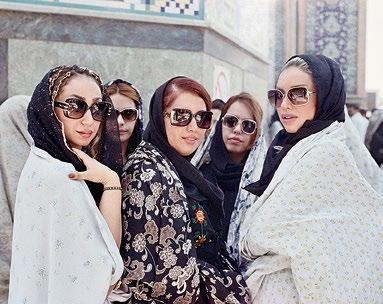
november
248 pp., 170 color illus., 8.5 × 11.5 in. $65.00 Pb / 9781741741674
Art / Photography
north ameri C an rights only
Exhibition Dates:
Art Gallery of New South Wales, September 2023–February 2024
distributed for art gallery of ne W south W ales
u niversity of Washington Press F all 2023 45
Seattle from the Margins Exclusion, Erasure, and the Making of a Pacific Coast City

Megan Asaka
$24.95 P b / 9780295751863
The Forging of a Black Community

Seattle’s Central District from 1870 through the Civil Rights Era, 2nd ed.
Quintard Taylor
Forewords by Quin’Nita Cobbins-Modica and Norman Rice
Afterword by Albert S. Broussard
$24.95s P b / 9780295750415
Uncle Rico’s Encore

Mostly True Stories of Filipino Seattle
Peter Bacho
$24.95 h C / 9780295749778
The River That Made Seattle A Human and Natural History of the Duwamish


BJ Cummings
$19.95 P b / 9780295750989
Emerald Street
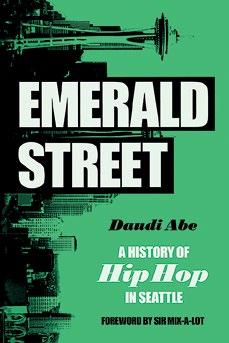
A History of Hip Hop in Seattle
Daudi Abe
Foreword by Sir Mix-A-Lot
$24.95 Pb / 9780295747569
Native Seattle
Histories from the Crossing-Over Place
second edition
Coll Thrush
Foreword by William Cronon
$24.95 Pb / 9780295741345
essential seattle
46 Fall 2023 u niversity of Washington Press
Skid Road
On the Frontier of Health and Homelessness in Seattle

Josephine Ensign
$19.95 P b / 9780295751542
Too High and Too Steep Reshaping Seattle’s Topography
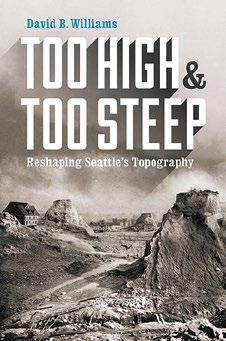
David B. Williams
$19.95 P b / 9780295999401
Stomp and Shout
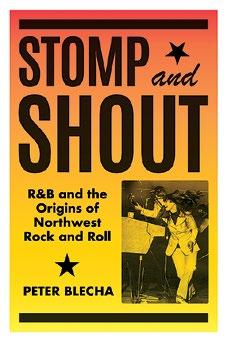
R&B and the Origins of Northwest Rock and Roll
Peter Blecha
$29.95 h C / 9780295751252
Biking Uphill in the Rain
The Story of Seattle from behind the Handlebars

Tom Fucoloro
$29.95 h C / 9780295751580
Art in Seattle’s Public Spaces
From SoDo to South Lake Union
James Rupp and Miguel Edwards
$34.95 P b / 9780295744087
Homewaters
A Human and Natural History of Puget Sound


David B. Williams
$19.95 P b / 9780295751009
essential seattle
u niversity of Washington Press F all 2023 47
The Boathouse

The Artist’s Studio of Dale Chihuly
Leslie Jackson Chihuly, David B. Williams, and William Warmus
$36.00 h C / 9781576841198
Features an exclusive glimpse into the private working studio of artist Dale Chihuly, and into the history of its location on the shores of Lake Union in Seattle.
Seattle’s Olympic Sculpture Park

A Place for Art, Environment, and an Open Mind
Edited by Mimi Gardner Gates
$45.00 h C /9780932216809
This informative and visually stunning book will be a vital resource for museum professionals, architects, urban planners, students, and general art lovers.

The Hope of Another Spring
Takuichi Fujii, Artist and Wartime Witness
Barbara Johns
Foreword by Roger Daniels / Introduction to the Diary by Sandy Kita
$44.95 h C / 9780295999999
“Compelling as both artwork and history.”
—Michael Upchurch, Seattle Times
Signs of Home
The Paintings and Wartime Diary of Kamekichi Tokita

Barbara Johns
Foreword by Stephen H. Sumida
$34.95 P b / 9780295749693
“A deeply moving human story.”
—Susan Kunimatsu, International Examiner
Pa C ifi C n orth W est a rt
48 Fall 2023 u niversity of Washington Press
Between the Tides in Washington and Oregon

Exploring Beaches and Tidepools
Ryan P. Kelly, Terrie Klinger, and John J. Meyer
$24.95 P b / 9780295749969
After the Blast
The Ecological Recovery of Mount St. Helens

Eric Wagner
$19.95 Pb / 9780295750712
The Weather of the Pacific Northwest

second edition
Cliff Mass
$34.95 Pb / 9780295748443
Hiking Washington’s History

second edition
Judy Bentley and Craig Romano
$19.95 Pb / 9780295748528
The North Cascades Highway

A Roadside Guide to America’s Alps
Jack McLeod
$26.95 Pb / 9780295993164
Olympic National Park

A Natural History
fourth edition
Tim McNulty
$29.95 Pb / 9780295743288
Pa C ifi C n orth W est destinations
u niversity of Washington Press F all 2023 49
Heaven on the Half Shell
The Story of the Oyster in the Pacific Northwest
second edition
David George Gordon, Samantha Larson, and MaryAnn Barron Wagner
Foreword by Kenneth K. Chew
$29.95 P b / 9780295750781
Starting with the earliest evidence of sea gardens and clam beds from 11,500 years ago, this book covers the history of Pacific Northwest oyster cultivation through contemporary aquaculture. Now fully updated and expanded, this classic text shares new insights on emerging challenges to the oyster farmer’s life as well as increased coverage of the roles of women and contemporary tribes in building this cultural tradition, past and present. Newcomers and aficionados alike will also be delighted by the carefully selected recipes from the region’s top chefs.
“The definitive work on the trials and triumphs of the Pacific Northwest oyster industry. Essential reading for oyster lovers and farmers alike.”—Rowan Jacobsen, James Beard Award–winning author of A Geography of Oysters: The Connoisseur’s Guide to Oyster Eating in North America
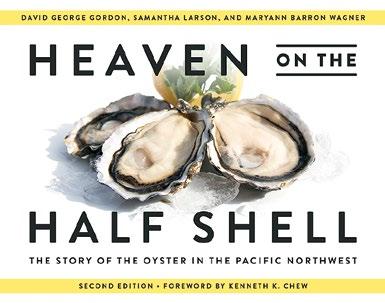
Fishes of the Salish Sea



Puget Sound and the Straits of Georgia and Juan de Fuca
t hree-volume boxed set
Theodore Wells Pietsch and James Wilder Orr
Illustrated by Joseph R. Tomelleri
$165.00 h C / 9780295743745
“The definitive guide to the coastal fish of Washington State and British Columbia is as lovely as it is weighty. . . . Luminous color illustrations of each fish set against a white background make this a work of art, as well as an unmatched scientific reference.”

—Natural History Magazine
“This monumental effort represents many years of work, tremendous attention to detail, and an obvious love for the subject.”
—Quarterly Review of Biology
“Stunning, lavish, comprehensive, and accurate: these four words epitomize Pietsch and Orr’s [2019] new magnum opus on the diversity, identification, ecology, and distribution of the 260 fish species that inhabit the Pacific Northwest’s Salish Sea.”
—Northwestern Naturalist
Winner of the 2020 Prose aW ard in t extbook/ b iologi C al sC ien C e C ategory, s P onsored by the a sso C iation of a meri C an Publishers
Winner of the 2020 g old aW ard in the r eferen C e b ook C ategory, s P onsored by the PubWest a sso C iation
s hortlisted for the 2020 a li C e aW ard, s P onsored by the f urthermore f oundation
natural history
50 Fall 2023 u niversity of Washington Press
Edible and Medicinal Flora of the West Coast

The Pacific Northwest and British Columbia
expanded edition
Collin Varner
$22.95 P b / 9780295751849
For sale only in the u nited s tates
Pacific Northwest Insects

Merrill A. Peterson
$34.95 P b / 9780914516187
F or sale only in the united states
Invasive Flora of the West Coast British Columbia and the Pacific Northwest

Collin Varner
$19.95 P b / 9780295750996
F or sale only in the united states
The Flora and Fauna of the Pacific Northwest Coast


Collin Varner
$34.95 P b / 9780295744643
F or sale only in the united states
Flora of the Pacific Northwest
An Illustrated Manual
s econd e dition
C. Leo Hitchcock and Arthur Cronquist
Edited by David E. Giblin, Ben S. Legler, Peter F. Zika, and Richard G. Olmstead
$80.00s h C / 9780295742885
Gardening with Native Plants of the Pacific Northwest

t hird e dition
Arthur R. Kruckeberg and Linda Chalker-Scott
Foreword by Richard G. Olmstead
$39.95 P b / 9780295744155
natural history / gardening
u niversity of Washington Press F all 2023 51
Cherokee Earth Dwellers

Stories and Teachings of the Natural World
Christopher B. Teuton and Hastings Shade
With Loretta Shade and Larry Shade
Illustrated by MaryBeth Timothy
$34.95 P b / 9780295750187
The Art of Ceremony
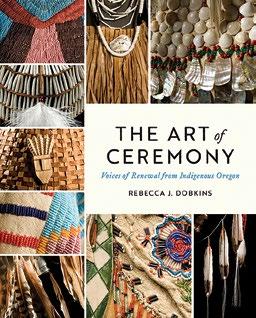
Voices of Renewal from Indigenous Oregon
Rebecca J. Dobkins
$34.95 P b / 9780295750668
Jesintel
Living Wisdom from Coast Salish Elders
Children of the Setting Sun Productions
Edited by Darrell Hillaire and Natasha Frey
Photographs by Fay “Beau” Garreau Jr.
$34.95 P b / 9780295748641
Anakú Iwachá
Yakama Legends and Stories
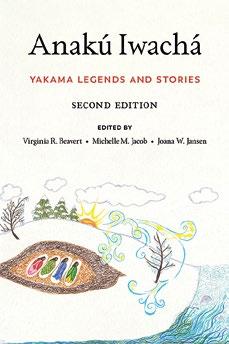
second edition
Edited by Virginia R. Beavert, Michelle M. Jacob, and Joana W. Jansen
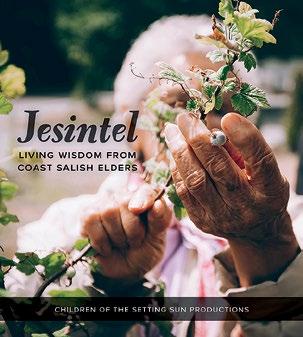
$29.95 Pb / 9780295748245
Shapes of Native Nonfiction
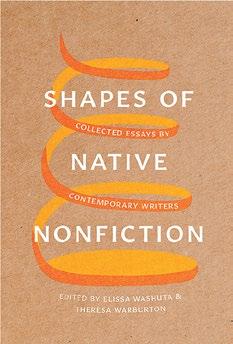
Collected Essays by Contemporary Writers
Edited by Elissa Washuta and Theresa Warburton
$29.95 Pb / 9780295745756
Haboo
Native American Stories from Puget Sound

second edition
Translated and edited by Vi Hilbert
Introduction by Thom Hess
Foreword by Jill La Pointe
$29.95 Pb / 9780295746968
n ative a meri C an and i ndigenous s tudies
52 Fall 2023 u niversity of Washington Press
i ndigenous c onfluences
Charlotte Coté and Coll Thrush, series editors
Indigenous Confluences publishes innovative works that use decolonizing perspectives and transnational approaches to explore the experiences of Indigenous peoples across North America, with a special emphasis on the Pacific coast.


Settler Cannabis
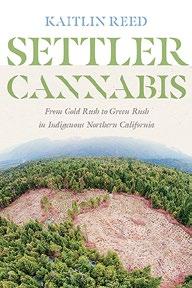
From Gold Rush to Green Rush in Indigenous Northern California
Kaitlin Reed
$30.00 s P b / 9780295751566
We Are Dancing for You Native Feminisms and the Revitalization of Women’s Coming-of-Age Ceremonies

Cutcha Risling Baldy
$30.00 s P b / 9780295743448
A Drum in One Hand, a Sockeye in the Other Stories of Indigenous Food Sovereignty from the Northwest Coast
Charlotte Coté
$29.95 P b / 9780295749525
Indian Blood

HIV and Colonial Trauma in San Francisco’s Two-Spirit Community
Andrew J. Jolivette
$30.00 s P b / 9780295998503
Chinook Resilience
Heritage and Cultural Revitalization on the Lower Columbia River
Jon D. Daehnke
Foreword by Tony A. Johnson
$30.00 s P b / 9780295742267
California through Native Eyes Reclaiming History

William J. Bauer Jr.
$30.00 s P b / 9780295998350
u niversity of Washington Press F all 2023 53
n ative a rt of the p acific n orthwest: a b ill h olm c enter s eries
This series publishes important new research on the Native art and culture of the greater Pacific Northwest and aims to foster appreciation of the dynamic cultural and artistic expressions of the Indigenous peoples of the region.
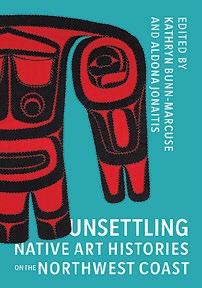
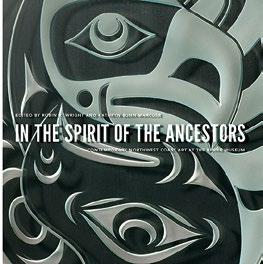
Skidegate House Models

From Haida Gwaii to the Chicago World’s Fair and Beyond
Robin K. Wright
$49.95 h C / 9780295751047
Painful Beauty Tlingit Women, Beadwork, and the Art of Resilience

Megan A. Smetzer
$39.95 h C / 9780295748948
Unsettling Native Art Histories on the Northwest Coast
Edited by Kathryn Bunn-Marcuse and Aldona Jonaitis
$29.95 P b / 9780295750705
Art of the Northwest Coast second edition


Aldona Jonaitis
$29.95 P b / 9780295748559
Northwest Coast Indian Art An Analysis of Form
50th a nniversary e dition
Bill Holm

$29.95 P b / 9780295994277
In the Spirit of the Ancestors
Contemporary Northwest Coast Art at the Burke Museum
Edited by Robin K. Wright and Kathryn Bunn-Marcuse
$34.95 P b / 9780295995212
54 Fall 2023 u niversity of Washington Press
Not Native American Art

Fakes, Replicas, and Invented Traditions
Janet Catherine Berlo
Foreword by Joe Horse Capture
$39.95 h C / 9780295751368
Sharing Honors and Burdens
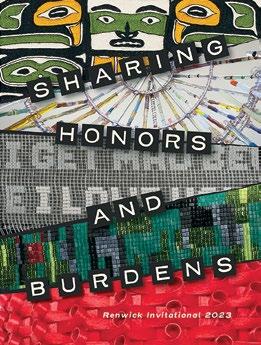
Renwick Invitational 2023
Lara M. Evans, Miranda Belarde-Lewis, and Anya Montiel
$34.95 P b / 9780937311882
Shifting Grounds
Landscape in Contemporary
Native American Art
Kate Morris
$35.00s P b / 9780295749167
Each/Other

Marie Watt and Cannupa Hanska Luger
John P. Lukavic
With contributions by Jami Powell and Namita Gupta Wiggers
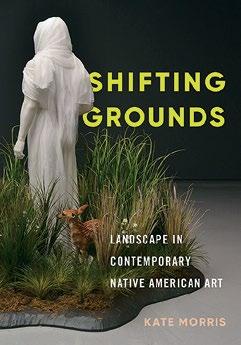
$30.00 h C / 9781945483097
Transformations
The George and Colleen Hoyt Collection of Northwest Coast Art
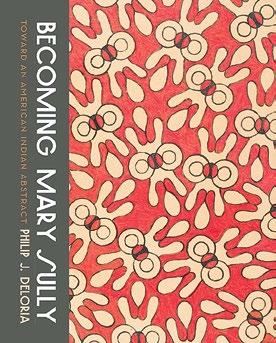

Rebecca J. Dobkins and Tasia D. Riley
Foreword by John Olbrantz
$50.00 h C / 9781930957855
Becoming Mary Sully
Toward an American Indian Abstract
Philip J. Deloria
$34.95 P b / 9780295745046
native ameri C an and indigenous art u niversity of Washington Press F all 2023 55
d ecolonizing f eminisms
Piya Chatterjee, series editor
Decolonizing Feminisms explores the integral connections between theory, activism, policy making, and other forms of social action. The series brings together new work by US women of color, Indigenous, and transnational feminists to envision critical and imaginative frameworks for political resistance and progressive social change.
Feminista Frequencies

Community Building through Radio in the Yakima Valley
Monica De La Torre
$27.95 P b / 9780295749662
Dancing Transnational Feminisms

Ananya Dance Theatre and the Art of Social Justice
Edited by Ananya Chatterjea, Hui Niu Wilcox, and Alessandra Lebea Williams
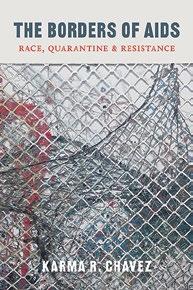
Foreword by D. Soyini Madison
$30.00s P b / 9780295749556
Making Livable Worlds

Afro-Puerto Rican Women Building
Environmental Justice
Hilda Lloréns
$30.00s P b / 9780295749402
The Borders of AIDS
Race, Quarantine, and Resistance
Karma R. Chávez
$30.00 s P b / 9780295748979
Resisting Disappearance
Military Occupation and Women’s Activism in Kashmir

Ather Zia
$30.00 s P b / 9780295744988
Asian American Feminisms and Women of Color Politics

Edited by Lynn Fujiwara and Shireen Roshanravan
$30.00 s P b / 9780295744353
56 Fall 2023 u niversity of Washington Press
f eminist t echnosciences
Rebecca Herzig and Banu Subramaniam, series editors
Feminist Technosciences publishes emerging, intersectional, cutting-edge feminist work. The series foregrounds insights from queer studies, critical race studies, disability studies, animal studies, postcolonial theory, and other critical approaches that reframe and reignite long-standing questions in feminist science and technology studies.
Bad Dog
Pit Bull Politics and Multispecies Justice

Harlan Weaver
$30.00 s P b / 9780295748023
Holy Science
The Biopolitics of Hindu Nationalism

Banu Subramaniam
$30.00 s P b / 9780295745596
Molecular Feminisms
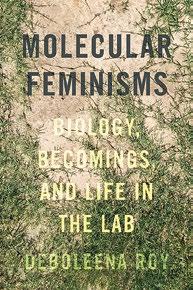
Biology, Becomings, and Life in the Lab
Deboleena Roy
$30.00 s P b / 9780295744100
oa e dition / doi 10.6069/j163-3 C 90
Queer Feminist Science Studies

A Reader
Edited by Cyd Cipolla, Kristina Gupta, David A. Rubin, and Angela Willey
$30.00 s P b / 9780295742588
Underflows
Queer Trans Ecologies and River Justice

Cleo Wölfle Hazard
$30.00s Pb / 9780295749754
Gender before Birth
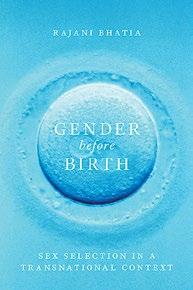
Sex Selection in a Transnational Context
Rajani Bhatia
$30.00 s P b / 9780295999210
u niversity of Washington Press F all 2023 57
Women’s, g ender, and s exuality s tudies
Stitching Love and Loss

A Gee’s Bend Quilt
Lisa Gail Collins
$29.95 h C / 9780295751603
Unshaved Resistance and Revolution in Women’s Body Hair Politics

Breanne Fahs
$30.00s P b / 9780295750286
Firebrand Feminism

The Radical Lives of Ti-Grace Atkinson, Kathie Sarachild, Roxanne Dunbar-Ortiz, and Dana Densmore
Breanne Fahs
$29.95 P b / 9780295743165
Black Women in Sequence

Re-inking Comics, Graphic Novels, and Anime
Deborah Elizabeth Whaley
$30.00s Pb / 9780295994963
Tea and Solidarity
Tamil Women and Work in Postwar Sri Lanka

Mythri Jegathesan
$30.00 s P b / 9780295745671
Woke Gaming
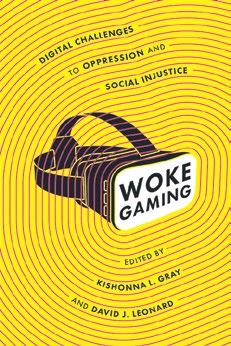
Digital Challenges to Oppression and Social Injustice
Edited by Kishonna L. Gray and David J. Leonard
$30.00s P b / 9780295744179
58 Fall 2023 u niversity of Washington Press
Uncle Rico’s Encore
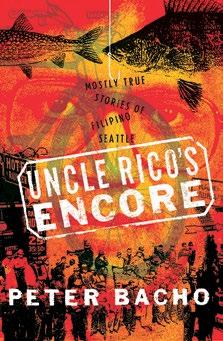
Mostly True Stories of Filipino Seattle
Peter Bacho
$24.95 h C / 9780295749778
Love Your Asian Body
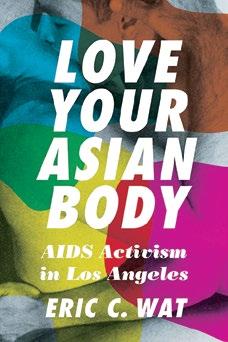
AIDS Activism in Los Angeles
Eric C. Wat
$29.95 P b / 9780295749334
Contemporary Asian American Activism
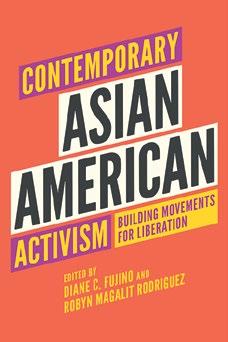
Building Movements for Liberation
Edited by Diane C. Fujino and Robyn Magalit Rodriguez
$30.00s P b / 9780295749808
Nisei Radicals
The Feminist Poetics and Transformative Ministry of Mitsuye
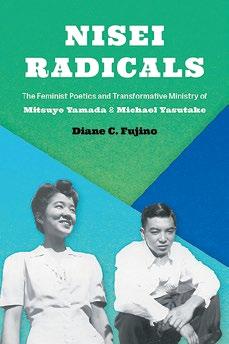
Yamada and Michael Yasutake
Diane C. Fujino
$30.00s P b / 9780295748269
The Unsung Great Stories of Extraordinary Japanese Americans
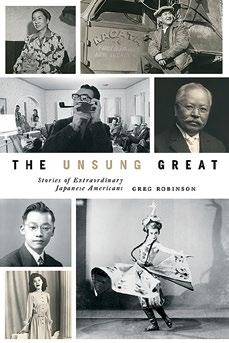
Greg Robinson
$29.95 P b / 9780295747965
New Women of Empire
Gendered Politics and Racial Uplift in Interwar Japanese America

Chrissy Yee Lau
$30.00s P b / 9780295750521
a sian a meri C an s tudies
u niversity of Washington Press F all 2023 59
Wide-Open Desert
A Queer History of New Mexico

Jordan Biro Walters
$30.00s P b / 9780295751023
Black Lives in Alaska

A History of African Americans in the Far Northwest
Ian C. Hartman and David Reamer
Foreword by Calvin E. Williams
$24.95 P b / 9780295750934
Outriders
Rodeo at the Fringes of the American West

Rebecca Scofield
$30.00s P b / 9780295746777
Urban Cascadia and the Pursuit of Environmental Justice

Edited by Nik Janos and Corina McKendry
$30.00s P b / 9780295749365
The Port of Missing Men

Billy Gohl, Labor, and Brutal
Times in the Pacific Northwest
Aaron Goings
$19.95 P b / 9780295751207
The Portland Black Panthers

Empowering Albina and Remaking a City
Lucas N. N. Burke and Judson L. Jeffries
$24.95 P b / 9780295742717
us history
60 Fall 2023 u niversity of Washington Press
Bellwether Histories

Animals, Humans, and US Environments in Crisis
Edited by Susan Nance and Jennifer Marks
$30.00 s P b / 9780295751429
Pioneering Death
The Violence of Boyhood in Turn-of-the-Century Oregon

Peter Boag
$30.00s P b / 9780295750637
Labor under Siege
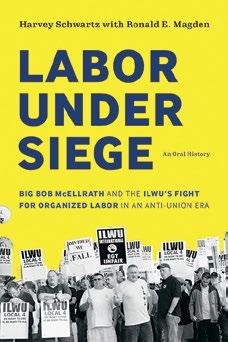
Big Bob McEllrath and the ILWU’s Fight for Organized Labor in an Anti-Union Era
Harvey Schwartz with Ronald E. Magden
$30.00s P b / 9780295750330
The Great Quake Debate

The Crusader, the Skeptic, and the Rise of Modern Seismology
Susan Hough
$19.95 P b / 9780295750729
Reclaiming the Reservation
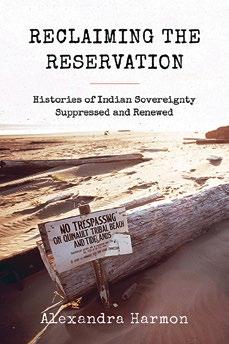
Histories of Indian Sovereignty
Suppressed and Renewed
Alexandra Harmon
$35.00s Pb / 9780295745855
Love for Liberation
African Independence, Black Power, and a Diaspora Underground
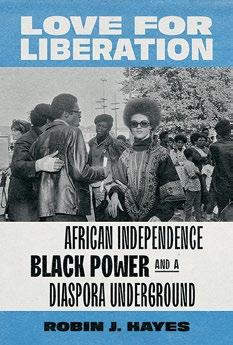
Robin J. Hayes
$30.00s Pb / 9780295749075
u s h istory
u niversity of Washington Press F all 2023 61
Surviving the Sanctuary City Asylum-Seeking Work in Nepali New York

Tina Shrestha
$30.00 s P b / 9780295751528
Modified Bodies, Material Selves Beauty Ideals in Post-Reform Shanghai
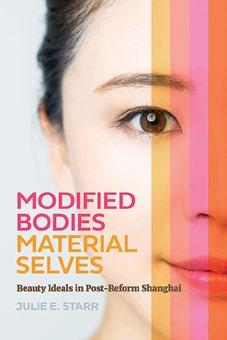
Julie E. Starr
$32.00 s P b / 9780295751764
Fukushima Futures
Survival Stories in a Repeatedly Ruined Seascape

Satsuki Takahashi
Foreword by K. Sivaramakrishnan
$32.00 s P b / 9780295751344
Fixing the Image

Ultrasound and the Visuality of Care in Phnom Penh
Jenna Grant
$32.00s P b / 9780295750613
Single Mothers and the State’s Embrace Reproductive Agency in Vietnam
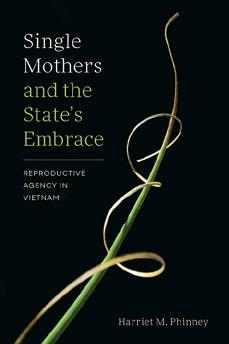
Harriet M. Phinney
$32.00s P b / 9780295749433
Making Livable Worlds

Afro-Puerto Rican Women
Building Environmental Justice
Hilda Lloréns
$30.00s P b / 9780295749402
anthro P ology
62 Fall 2023 u niversity of Washington Press
Sustaining Natures
An Environmental Anthropology Reader

Edited by Sarah R. Osterhoudt and K. Sivaramakrishnan
$32.00 s P b / 9780295751450
Misreading the Bengal Delta Climate Change, Development, and Livelihoods in Coastal Bangladesh

Camelia Dewan
Foreword by K. Sivaramakrishnan
$32.00s P b / 9780295749617
oa e dition / doi 10.6069/9780295749624
Timber and Forestry in Qing China
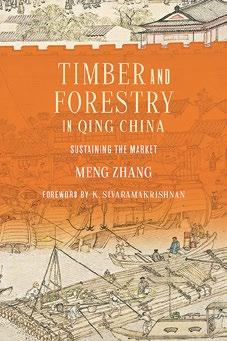
Sustaining the Market
Meng Zhang
Foreword by K. Sivaramakrishnan
$32.00 s P b / 9780295748870
Mapping Water in Dominica
Enslavement and Environment under Colonialism
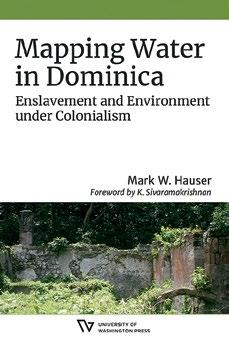
Mark W. Hauser
Foreword by K. Sivaramakrishnan
$32.00 s P b / 9780295748726
oa edition / doi 10.6069/9780295748733
Herring and People of the North Pacific

Sustaining a Keystone Species
Thomas F. Thornton and Madonna L. Moss
$30.00 s P b / 9780295748290
Shifting Livelihoods
Gold Mining and Subsistence in the Chocó, Colombia
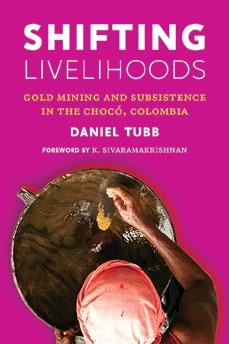
Daniel Tubb
Foreword by K. Sivaramakrishnan
$32.00 s P b / 9780295747538
e nviornmental a nthro P ology
u niversity of Washington Press F all 2023 63
c ulture, p lace, and n ature
K. Sivaramakrishnan, series editor
Centered in anthropology, the Culture, Place, and Nature series encompasses new interdisciplinary social science research on environmental issues, focusing on the intersection of culture, ecology, and politics in global, national, and local contexts. Contributors to the series view environmental knowledge and issues from the multiple and often conflicting perspectives of various cultural systems.
The Camphor Tree and the Elephant Religion and Ecological Change in Maritime Southeast Asia
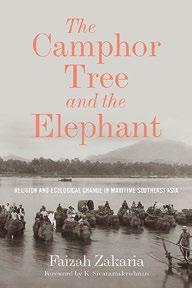
Faizah Zakaria
$32.00 s P b / 9780295751184
Spawning Modern Fish Transnational Comparison in the Making of Japanese Salmon
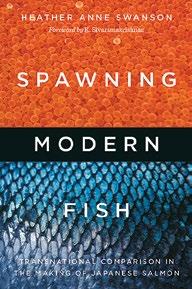
Heather Anne Swanson
$32.00s P b / 9780295750392
Turning Land into Capital Development and Dispossession in the Mekong Region
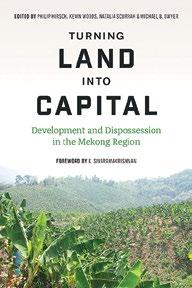
Edited by Philip Hirsch, Kevin Woods, Natalia Scurrah, and Michael B. Dwyer
$32.00s P b / 9780295750460
Upland Geopolitics
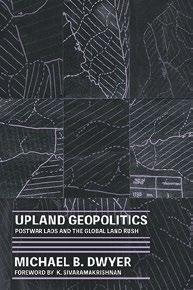
Postwar Laos and the Global Land Rush
Michael B. Dwyer
$32.00s P b / 9780295750491
oa edition / doi 10.6069/9780295750507
Sustaining Natures
An Environmental Anthropology Reader

Edited by Sarah R. Osterhoudt and K. Sivaramakrishnan
$32.00 s P b / 9780295751450
Ordering the Myriad Things From Traditional Knowledge to Scientific Botany in China
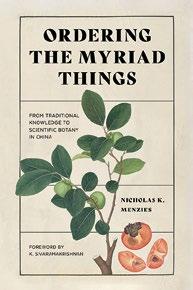
Nicholas K. Menzies
$32.00s P b / 9780295749464
64 Fall 2023 u niversity of Washington Press
Culture, Pla C e, and n ature
Consuming Ivory Mercantile Legacies of East Africa and New England
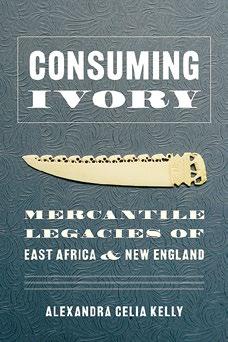
Alexandra Celia Kelly
$32.00 s P b / 9780295748818
Sacred Cows and Chicken Manchurian

The Everyday Politics of Eating Meat in India
James Staples
$32.00 s P b / 9780295747880
F or sale outside o F south asia
Mountains of Blame
Climate and Culpability in the Philippine Uplands Will Smith
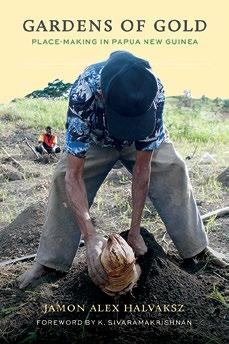

$32.00 s P b / 9780295748160
Gardens of Gold
Place-Making in Papua New Guinea
Jamon Alex Halvaksz
$32.00 s P b / 9780295747590
The Snow Leopard and the Goat Politics of Conservation in the Western Himalayas
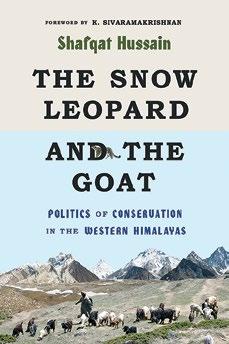
Shafqat Hussain
$32.00 s P b / 9780295746579
F or sale outside o F south asia
Roses from Kenya Labor, Environment, and the Global Trade in Cut Flowers

Megan A. Styles
$32.00s P b / 9780295746500
u niversity of Washington Press F all 2023 65
studies on ethnic groups in china

Stevan
Harrell, series editor
Pure and True
The Everyday Politics of Ethnicity for China’s Hui Muslims

David R. Stroup
$32.00s Pb / 9780295749839
Exile from the Grasslands
Tibetan Herders and Chinese Development Projects
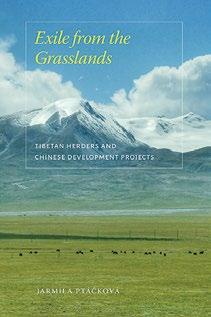
Jarmila Ptáčková
$32.00s P b / 9780295748191
oa edition / doi 10.6069/9780295748207
The Nuosu Book of Origins
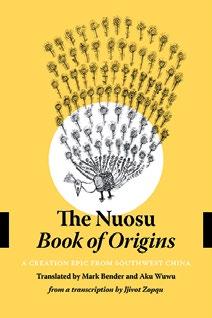
A Creation Epic from Southwest China
Translated by Mark Bender and Aku Wuwu from a transcription by Jjivot Zopqu
$32.00 s P b / 9780295745695
oa edition / doi 10.6069/9780295745701
Xinjiang and the Modern Chinese State

Justin M. Jacobs
$32.00s P b / 9780295742649
oa edition / doi 10.6069/9780295806570
The Han China’s Diverse Majority
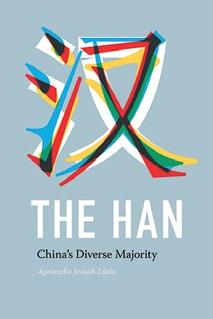
Agnieszka Joniak-Luthi
$32.00s P b / 9780295741789
oa edition / doi 10.6069/9780295805979
In the Circle of White Stones

Moving through Seasons with Nomads of Eastern Tibet
Gillian G. Tan
$32.00s P b / 9780295999487
66 Fall 2023 u niversity of Washington Press
s tudies on e thni C g rou P s in China
Mapping Shangrila Contested Landscapes in the Sino-Tibetan Borderlands


Edited by Emily T. Yeh and Chris Coggins
Foreword by Stevan Harrell
Afterword by Ralph A. Litzinger
$32.00 s P b / 9780295993584
oa edition / doi 10.6069/9780295805023
A Landscape of Travel
The Work of Tourism in Rural Ethnic China

Jenny Chio
$32.00 s P b / 9780295993669
oa edition / doi 10.6069/9780295805061
Doing Business in Rural China
Liangshan’s New Ethnic Entrepreneurs
Thomas Heberer
$32.00 s P b / 9780295993737
oa edition / doi 10.6069/9780295804095
In the Land of the Eastern Queendom The Politics of Gender and Ethnicity on the Sino-Tibetan Border

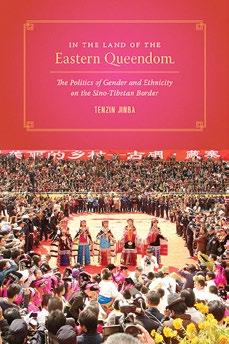
Tenzin Jinba
$32.00 s P b / 9780295993072
oa edition / doi 10.6069/9780295804842
Empire and Identity in Guizhou
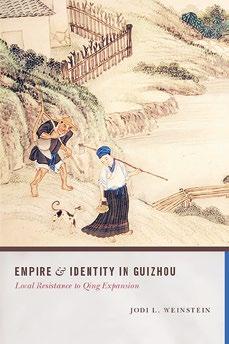
Local Resistance to Qing Expansion
Jodi L. Weinstein
$32.00 s P b / 9780295993270
oa edition / doi 10.6069/9780295804811
China’s New Socialist Countryside
Modernity Arrives in the Nu River Valley
Russell Harwood
$32.00 s P b / 9780295993386
oa edition / doi 10.6069/9780295804781
u niversity of Washington Press F all 2023 67
The Brush of Insight Artists and Agency at the Mughal Court

Yael Rice
$65.00s h C / 9780295751092
Opening Kailasanatha

The Temple in Kanchipuram
Revealed in Time and Space
Padma Kaimal
$65.00s h C / 9780295747774
Old Stacks, New Leaves
The Arts of the Book in South Asia
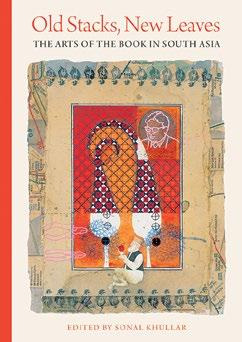
Edited by Sonal Khullar
$65.00s h C / 9780295751115
Porcelain for the Emperor Manufacture and Technocracy in Qing China

Kai Jun Chen
$65.00 s h C / 9780295750828
Spatial Dunhuang
Experiencing the Mogao Caves
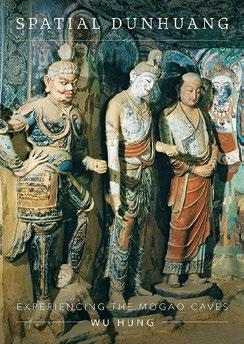
Wu Hung
$65.00s h C / 9780295750200
The Ghost in the City
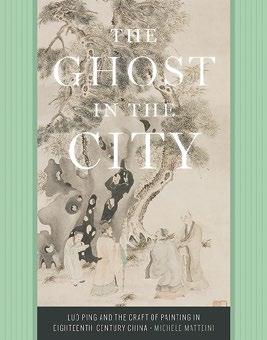
Luo Ping and the Craft of Painting in Eighteenth-Century China
Michele Matteini
$65.00s h C / 9780295750958
asian art
68 Fall 2023 u niversity of Washington Press
Temples in the Cliffside
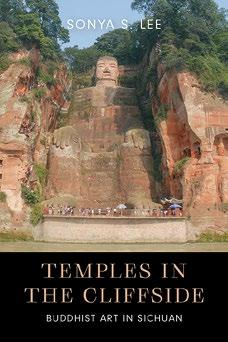
Buddhist Art in Sichuan
Sonya S. Lee
$65.00s h C / 9780295749303
A Fashionable Century
Textile Artistry and Commerce in the Late Qing

Rachel Silberstein
$65.00s h C / 9780295747187
Artisans in Early Imperial China
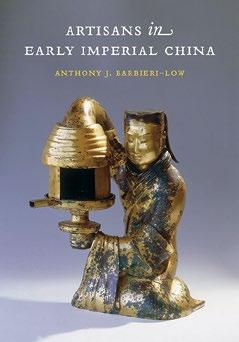

Anthony J. Barbieri-Low
$40.00s P b / 9780295749389
The City in Time

Contemporary Art and Urban Form in Vietnam and Cambodia
Pamela N. Corey
$65.00s h C / 9780295749235
Yumeji Modern Designing the Everyday in Twentieth-Century Japan

Nozomi Naoi
$65.00s h C / 9780295746838
Carving Status at Kŭmgangsan
Elite Graffiti in Premodern Korea
Maya K. H. Stiller
$65.00 s h C / 9780295749259
asian art
u niversity of Washington Press F all 2023 69
ordering and sales information
offices
University of Washington Press
Box 359570
Seattle, WA 98195-9570
Fax: (206) 543-3932
Email: uwapress@uw.edu
Website: uwapress.uw.edu
how to order Individuals
We encourage you to support your local bookseller. You can also order directly from our website or by contacting our US distributor, Hopkins Fulfillment Services (HFS):
Online: uwapress.uw.edu
Phone: (800) 537-5487
Email: hfscustserv@press.jhu.edu
Booksellers
Our books are represented to bookstores, museum stores, and specialty stores by a dedicated, experienced team of sales representatives in the United States and around the world. Booksellers should contact their local representative to order our titles. To set up an account or order directly, please contact our US distributor, Hopkins Fulfillment Services (HFS):
Phone: (800) 537-5487
Fax: (410) 516-6998
Email: hfscustserv@press.jhu.edu
Mailing address:
University of Washington Press
c/o Hopkins Fulfillment Services
PO Box 50370
Baltimore, MD 21211-4370
G eneral information
Prices, discounts, and publication dates are subject to change without notice. Our discount schedule is available upon request. For return policies and instructions, please visit our website.
catalo G discount codes
Discount codes follow retail prices.
Trade: No mark
Short: s
Text: x
ebooks
Digital editions of all titles listed with an EB ISBN are widely available through ebook vendors.
e X amination copies
Examination copies are available at the discretion of the press to qualified instructors of appropriate courses. For instructions on how to request an examination copy, please visit our website.
ri G hts and permissions
For inquiries about rights and permission, please contact Beth Fuget at bfuget@uw.edu. Unless otherwise specified, world rights are available for titles listed in this catalog and on our website.
publishin G partners
The University of Washington Press distributes books from the following publishing partners:
Art Gallery of New South Wales
Fowler Museum at UCLA
International Sculpture Center
LM Publishers
Museum for African Art National Gallery of Australia
Power Publications
Silkworm Books
UCLA Chicano Studies Research Center Press
70 Fall 2023 u niversity of Washington Press
s ales r e P resentatives
p acific n orthwest
Kurtis Lowe ( ak , or , W a ) kurtis@imprintgroupwest.com
(206) 409-7056
Suzi Hough ( id, mt ) suzi@imprintgroupwest.com
(800) 738-3961 ext. 4
w est ( a Z, ca , hi , nm , nv, ut )
William Gawronski
wgawronski@earthlink.net
(310) 488-9059
m idwest ( co, ks, ky, ia , il , in , mi , mn , mo, nd, ne , oh , ok , sd, wi , wy )
Kevin Kurtz
kk2841@columbia.edu
(773) 316-1116
m id-a tlantic and s outh ( al , ar , dc , fl , G a , la , md, ms, nc , sc , tn , t X, va , wv )
Catherine Hobbs
ch2714@columbia.edu
(804) 690-8529
n ortheast ( ct, de , ma , me , nh , ny, pa , ri , vt )
Conor Broughan
cb2476@columbia.edu
(917) 826-7676
m e X ico, c entral and s outh a merica, p uerto r ico, and the c aribbean
Craig Falk
craigfalk@aya.yale.edu
o rders and c ustomer s ervice
Hopkins Fulfillment Services
PO Box 50370
Baltimore, MD 21211-4370
hfscustserv@press.jhu.edu
(800) 537-5487
canada
Ampersand represents the press in the Canadian market.
Ampersand
Suite 213, 321 Carlaw Avenue
Toronto, ON M4M 2S1 www.ampersandinc.ca
(416) 703-0666
o rders and c ustomer s ervice in c anada
University of Toronto Press
5201 Dufferin Street
Toronto, ON M3H 5T8 utpbooks@utpress.utoronto.ca
(800) 565-9525
rest of world
Combined Academic Publishers Ltd. represents the press to all areas outside the Americas.
Combined Academic Publishers Ltd.
39 East Parade
Harrogate
North Yorkshire HG1 SLQ
United Kingdom
www.combinedacademic.co.uk enquiries@combinedacademic.co.uk
+44 (0) 1423 526350
i nternational o rders and c ustomer s ervice
Wiley European Distribution Centre New Era Estate
Oldlands Way, Bognor Regis
West Sussex
PO22 9NQ UK
mng.csd@wiley.com
+44 (0) 1243 843291
u niversity of Washington Press F all 2023 71
 Barbara Earl Thomas, A Joyful Noise, 2022. Cut paper and hand-printed color, 50 × 40 in.
Barbara Earl Thomas, A Joyful Noise, 2022. Cut paper and hand-printed color, 50 × 40 in.
title index
Art, Activism, and Sexual Violence 24
Barbara Earl Thomas 19
Capturing Glaciers 13
Charged 12
Cold War Deceptions 36
Cops on Campus 1
Dancer Dawkins and the California Kid 28
The Empire Looks South 40
The First Five 38
Full Light and Perfect Shadow 23
Glorious Qing 35
Hacking the Underground 16
Hatched 11
Heartbreak City 3
Hoda Afshar 44
Island X 30
Late Industrialization, Tradition, and Social Change in South Korea 37
Life and Afterlife in Ancient China 33
Queer Data Studies 17
Queer World Making 27
Regional Identities in Southeast Asia 39
Renegade Edo and Paris 21
Resisting the Nuclear 25
Serpent, Siren, Maelstrom, and Myth 9
Slapping Leather 15
Spirit Whales and Sloth Tales 7
Taiwan Lives 31
“There Are No Hispanic Stars!” 43
The Unknown Great 29
Vietnam 42
Who Cares? 41
A Will to Serve 5
author index
Alsford, Niki J. P. 31
Brown, Claudia 35
Cheng, Wendy 30
Cornelio, Jayeel 39
Dizon, Jude Paul Matias 1
Ellis, Jim 5
Faison, Elyssa 25
Fields, Alison 25
Ford, Elyssa 15
Gayed, Andrew 27
Gilpin, Dawn R. 24
Grabowsky, Volker 39
Ha, Yong-Chool 37
Han, Chan Wai 38
Harris, Peter 40
Inkpen, Dani 13
Keilty, Patrick 17
Kim, Willyce 28
Kitch, Sally L. 24
Korsmoe, Sam 42
Martin, David F. 23
Navarro, Gabriel 43
Needell, Carolyn Swan 19
Nesbitt, Elizabeth A. 7
Ott, Jennifer 5
Philip, Isobel Parker 45
Price, David H. 36
Rawson, Jessica 33
Robinson, Greg 29
Sciortino, Rosalia 41
Scofield, Rebecca 15
Scott, Shaun 3
Sloan, John J., III 1
Smyth, Gerry 9
Suriel, Yalile 1
Taylor, Brook 42
Turner, James Morton 12
Velho, Raquel 16
Warren, Gina G. 11
Watkins, Grace 1
Williams, David B. 7
Wu, Xiaojin 21

NON-PROFIT ORG. U.S. POSTAGE paid SEATTLE, WA PERMIT NO. 62 b ox 359570 | Seattle, wa 98195-9570 | usa uwapress.uw.edu




 Seattle Police Department baseball team (courtesy of the Seattle Municipal Archives)
Seattle Police Department baseball team (courtesy of the Seattle Municipal Archives)
 —Art Thiel,
—Art Thiel,

 Above: University of Washington regent Jim Ellis talks to UW students, Seattle, 1971
Right: Jim Ellis outside cabin, near Upper Preston, 1997
Above: University of Washington regent Jim Ellis talks to UW students, Seattle, 1971
Right: Jim Ellis outside cabin, near Upper Preston, 1997












 James Morton Turner
Foreword by Paul S. Sutter
James Morton Turner
Foreword by Paul S. Sutter

















 Edited by Elyssa Faison and Alison Fields
Edited by Elyssa Faison and Alison Fields








 Jessica Rawson
Jessica Rawson



 Yong-Chool Ha
Yong-Chool Ha
 Edited by Chan Wai Han
Edited by Chan Wai Han

 Peter Harris
Peter Harris
 Edited by Rosalia Sciortino
Edited by Rosalia Sciortino




















































































































































 Barbara Earl Thomas, A Joyful Noise, 2022. Cut paper and hand-printed color, 50 × 40 in.
Barbara Earl Thomas, A Joyful Noise, 2022. Cut paper and hand-printed color, 50 × 40 in.

